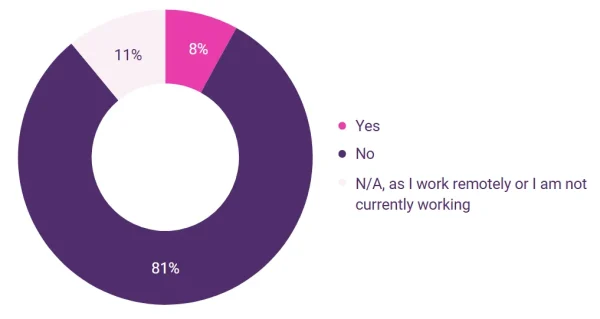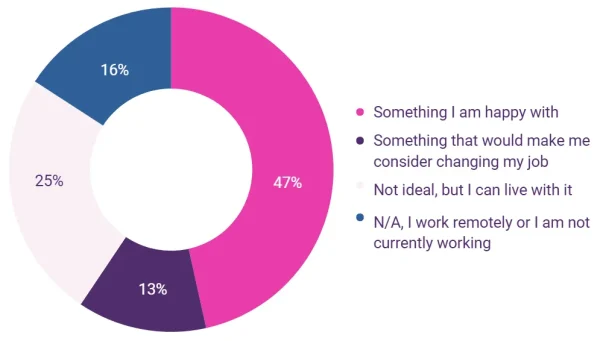EXECUTIVE
salary guide
2025
The Panel
salary guide 2025
Financial Services & Industry
Download the 2025 salary guide (pdf)View salary guide archiveIntroduction
The Panel is a recruitment consultancy based in Dublin, specialising in placing professional talents in Executive, Accountancy & Tax, Aircraft Leasing, Banking & Treasury, ESG & Sustainability, Funds & Investment Management, HR & Business Support, Technology, Transformation & Emerging Tech, and Legal & Company Secretarial.
Our specialist ethos was in our DNA from our start in 1987, when our founder, Brendan Burgess established ‘The Accountants Panel’. The IFSC Panel was then set up to meet the growing needs of the Financial Services Centre, followed by The Legal Panel and The IT Panel.
When Anne Keys and Paul McArdle took over as Joint Managing Partners in 2010, they rebranded the business as ‘The Panel’, encompassing all the various specialisations from financial to HR, serving all sectors and sizes, from start-ups to multi-nationals. The company remains wholly Irish-owned and managed.
Consultants at The Panel take pride in our reputation for finding the right roles for our candidates and for matching the ideal candidates for hard-to-fill positions. Whether you are a candidate or a client, we take time to get to know you, to understand your individual requirements, objectives and ambitions.
We are not just a professional service, we are a personal service, developing greater futures for individuals and businesses through relationships.
At The Panel we are one big CLAN. We are proud that our CLAN consists of colleagues from nine different countries across the globe. The Panel is a truly multi-cultural and diverse business and we will continue to embrace new CLAN members from around the world.

Meet Our Joint Managing Partners
Anne Keys leads The Panel’s executive search in the Funds and Investment Management sector and is uniquely placed to partner with firms hiring executives, board members, and independent non-executive directors.
Anne works closely with Funds and investment firms, building out or establishing a presence in Ireland, and has had great success sourcing Country Heads/CEOs, Head of Function, PCF and DP roles for her clients.Anne’s key differentiator is her extensive network developed over 25 years in recruitment and her technical knowledge of the roles she recruits for, in the funds and investment management space. She provides consultancy advice on the talent landscape, talent availability and is hugely knowledgeable on the sourcing requirements driven by the CBI.
Anne was instrumental in the setup and launch of 100 Women in Finance in Ireland and is Co-Chair of the steering committee in Dublin. She is driving 100WF workshops for senior practitioner members, advising them on how to launch their independent non-executive director career.
Anne has been invited to speak at key industry conferences in Dublin, London and Amsterdam on “CP86, Dear Chair – Getting the plan right”, “The talent landscape in the Funds & Investment Management sector in Ireland”, “ The War for Talent”, “ The benefits of an international board” and “The benefits of a diverse board”. More recently she moderated a session at Irish Funds 2022 on hybrid working. BNP Paribas’s Chief Human Resources Officer Flavie Motte was part of this panel.
The Panel is a key sponsor of basis.point – a funds industry initiative in Ireland to help make a difference to those in need.
Contact Anne on +353 (0)1 6377088 | anne@thepanel.com
Paul McArdle joined the then named The Accountants Panel in October 1991, recruited by Brendan Burgess, the original founder. Paul has helped grow The Panel to becoming one of the country’s most respected professional recruitment firms.
Paul recruits across the C-suite – CEO, CCO, CFO, COO across all sectors of industry. A lot of his client base is private equity-backed businesses and/or entrepreneurial businesses, and he has a strong track record in securing the right talent for the right role.
Paul has particularly deep sectoral knowledge of the finance recruitment area and manages his own portfolio of clients, recruiting in Ireland and overseas. He is seen as a trusted advisor by candidates and clients alike.
Highly networked, Paul has recruited talent across different industries and different geographies.
He is a member of Ireland Gateway to Europe and travels to the U.S. annually to promote Irish business interests. Paul also supports a number of other initiatives as well as doing some mentoring.
Paul is a columnist with The Currency, writing on all things Talent & HR related. He collates the bi-annual Candidate Sentiment Survey with The Currency and also participates on podcasts and radio, talking all things recruitment.
He is passionate about recruitment technology and is trying to get a handle on AI and how it impacts talent now and in the future.
Contact Paul on +353 (0)1 6377041 paul@thepanel.com
Our Specialist Divisions
Executive
Recruiting for executive, C-suite, and non-executive directors (iNED) is a key component of our talent search, with clients working with us on both an exclusive and a retained basis.
Our Partners and senior team members are all well-versed in finding and placing senior staff members across a wide variety of industries, both nationally and internationally.
Roles include: CEO, CTO, COO, CFO, MD, iNED, Director, Manager, Partner, and Head.
Consultants: Anne Keys, Paul McArdle, Alan Bluett, Sarah Kelly, and Fergal Keys.
Accountancy & Tax
The Accountancy & Tax division focusses on accounting, finance, and tax jobs in Ireland at all levels of an organisation.
Roles include: CFOs, Finance Directors, Group Financial Controllers, Financial Services—Internal Audit, Financial Reporting, Financial Analysts, NQ Accountants, NQ Financial Accountants, Management Accountants, Tax Accountants, and accounts staff, such as Payroll, Accounts Payable, Accounts Receivable, Credit Control and general accounts staff.
Consultants: Paul McArdle, Andrew Ganly, and Ailbhe Mullen.
Aircraft Leasing
Led by our colleague Darina Heavey, we have a dedicated desk within this booming aircraft leasing sector.
Roles include: Aircraft Leasing, Director, SVP, VP, Head, Associate, Manager, FP&A, Finance, Financial Reporting, Accountant, Insurance, Leasing, Analyst, Tax, Treasury, Legal, Credit and many more.
Consultant: Darina Heavey
ESG & Sustainability
We have a dedicated desk within this exponential part of the job market. Darina is not only highly networked on the scene, but highly knowledgeable when it comes to the rising requirement for organisations to fill roles of this nature.
Roles include: Directors, Associate Directors, Consultants, Managers, Officers, Executives.
Sustainability/ESG – Head, Advisor, Coordinator, Officer, Reporting Manager.
Consultant: Darina Heavey
Banking, Treasury & Insurance
Our Banking and Treasury division caters for roles within banking, corporate treasury, commercial treasury and insurance with some of Ireland’s leading organisations.
Roles include: Corporate Treasurer, Treasurer, Treasury Analyst, Risk, Compliance, Quant, Stockbroking, Asset Management, Trading, Front Office, Middle Office, Back Office, Data, Settlement, Financial Advisor, Wealth Manager, Retail Banking, and Investment Banking.
Consultant: Alan Bluett
Resourcing: Farah Daoub
Funds & Investment Management
Our Funds, Investment Management & Fintech division handles jobs in Ireland at all levels of an organisation.
Roles include: Executive, Leadership ManCo, PCF-1/8/11//12/14/39A—F/42, Fund Administration, Investment, Compliance, Risk, Analyst, AML, Data, Fund Accounting, Transfer Agency, Depositary, Middle Office, Custody, Client Relationship Management, Financial Reporting, Fintech and iNEDs.
Consultants: Anne Keys, Alan Bluett , and Darina Heavey.
Resourcing: Farah Daoub
Fintech
Placing top talent in Fintech organisations of all sizes, blending finance and technology, including product management, software development, data analysis, cybersecurity, and business development.
Technology & Transformation
Our Technology, Transformation & Emerging Tech practice is one of our busiest divisions, catering for a variety of companies, both global and indigenous, as well as small to medium-sized companies. Our team works with both permanent and contract roles.
Roles include:
Financial Services – Banking, Capital Markets, Insurance, Treasury, Aviation Leasing, Fintech/RegTech/Payments and Funds, Asset and Investment Management.
Industry – Technology, Pharma, Sport, Professional Services, FMCG, Software, Distribution, Healthcare, Press, Facilities Engineering Management and Construction.
Specialities:
- Executive Market
- Business Transformation – Project Management, Business Analytics, Digital Transformation
- Data Science – Data Governance, Data Analytics, Business Intelligence
- Product Development, Software Development and Design
- Testing – QA, UAT
- DevOps, Cloud Engineering
- IT Security – Compliance, IT Audit
- Infrastructure / Hosting – Service Delivery, Operations, IT Support
- Network Engineering
- Security & Emerging Tech
Consultant: Fergal Keys
Resourcing: Ildiko Kiss
HR + Business Support
Offering top talent in all areas of HR and business support to organisations across all sectors.
Roles include: HR Director, HR Manager, HR Generalist, HR Business Partner, Head of HR, HR Resourcer, HR Administrator, Office Administrator, Office Manager, Office Coordinator, Recruiter, Executive/Personal.
Consultant: Ailbhe Mullen
Legal + Company Secretarial
The Legal practice at The Panel is one of Ireland’s longest-established specialist Legal recruiters. Our consultants are highly networked and extremely knowledgeable, offering candidates & clients extensive insight into the Legal recruitment market.
Clients include top and mid-tier (domestic and international) law firms, multinational companies, large indigenous organisations, as well as SMEs in sectors including: ESG, asset management, banking, insurance, technology, fintech, telecoms, energy, retail, aviation, pharmaceutical and professional services.
Roles include: Partners + Associates, General Counsel, Commercial Lawyers, Legal Directors, Senior Legal Counsel, Employment Lawyers, Construction Lawyers, and Company Secretarial professionals.
Consultant: Sarah Kelly
Executive Financial Services Summary
By Anne Keys, Joint Managing Partner
Review of 2024
Executive hiring in the ManCo space was more balanced in 2024, with fewer CEO roles available, as most firms seeking to establish a presence in Ireland have already set up operations and appointed their CEOs or Country Heads. At the C-suite level, most hiring throughout 2024 was focused on governance and finance positions—either replacing Heads of Compliance, Head of Risk and/or Head of Finance or bringing in more experienced professionals to support firms through their next phase of growth.
The DORA deadline of 17th January 2025 saw hiring in the Operational Risk area increase significantly as firms looked to add bench strength in this area and ensure expertise internally to meet the needs of the DORA regulation, driving demand for professionals with experience in digital operational resilience, risk management frameworks, and compliance with the new regulatory standards.
Many firms have transitioned from startup mode to business-as-usual operations, with a stronger focus on positioning Ireland as a profit centre and a key value-added hub for the group. CEOs spent much of 2024 advocating for Ireland within their organisations, securing internal business to be based here, and reinforcing the strategic importance of their Irish entities.
Key areas of focus for growth included private equity finance, governance, IT governance, client services/investor relations, and cybersecurity. Some firms are now replacing UK-based roles with positions in Ireland, not necessarily increasing headcount, but leveraging the opportunity to strengthen their teams and meet the substance requirements set by the Central Bank of Ireland.
In 2024, we saw a small but notable number of independently owned UK managers establish operations in Ireland and successfully obtain regulatory license approval from the Central Bank of Ireland within the specified timeframe.
Payments, e-money, Fintech & Cryptocurrency
The payments, e-money, fintech, and cryptocurrency sectors in Ireland have experienced significant growth in recent years, driven by the country’s favorable regulatory environment, strong talent pool, and increasing demand for innovative financial solutions. Ireland’s strategic position within the EU, coupled with its commitment to fostering technological advancements and financial services innovation, has made it a key hub for fintech and digital financial services. The growth in these sectors is further supported by increased investor interest, a surge in cross-border payments, and the rise of blockchain and cryptocurrency technologies, positioning Ireland as a leading destination for financial services innovation in Europe.
Candidates at all levels in 2024 continued to upskill in ESG / Sustainability, Digital Transformation, AI, and Tokenisation to ensure they stay ahead of changes and new developments in the sector.
Private markets
In 2025, a significant growth area for Ireland’s funds industry will be private markets, including private credit and related sectors. In 2024, we saw several clients expanding their teams in this space, which has contributed to building a robust pipeline of talent.
The industry is actively collaborating with the government, the Central Bank of Ireland (CBI), and other key stakeholders to develop a comprehensive regulatory framework for private markets, modelled after Luxembourg’s successful approach. This strategic effort aims to position Ireland as a leading hub for private markets, attracting both investment and expertise.
This focus on private markets gets particular mention in the Irish government’s 2030 strategy for the funds industry. They are focused on solidifying Ireland’s position as a global leader in financial services.
The strategy aims to foster growth in private markets, including private equity, private credit, and real assets, with the goal of attracting more international investment and expanding the country’s financial services ecosystem.
Hiring & skills in demand
The current global geopolitical landscape will likely lead to more cautious hiring practices for international firms in Ireland in 2025. However, there will still be strong demand for candidates with expertise in governance, technology, AI, and digital transformation. This is driven by regulatory requirements from the Central Bank of Ireland (CBI) and the ongoing need for innovation to keep pace with rapid digital advancements.
Industry expected to grow by 26%
The recently published report on the Irish Financial Services sector by EY outlines key insights regarding the sector’s projected growth, which is expected to increase by €3.4 billion by 2028. EY stated this growth will primarily come from the expansion of key areas like private markets, asset management, and financial technology (fintech), underpinned by global trends and investor interest.
This is hugely positive news for the sector, and like all sectors, we need to continuously evolve, innovate, and adapt to emerging trends and challenges. By embracing new technologies, strengthening regulatory frameworks, and fostering talent, the sector can capitalize on these growth opportunities and maintain its competitive edge in the global financial landscape.
Executive Industry Summary
By Paul McArdle, Joint Managing Partner
In 2024, The Panel’s Industry practice (non-financial services companies) was busy with roles across the C-suite, particularly in the CFO, COO, CEO, and CLO space. We mainly dealt with Irish-owned businesses rather than multinationals, businesses that were owner-managed and/or backed by private equity.
LTIPs
A Long-Term Incentive Plan (LTIP) was part of most of the remuneration packages where the business was PE-backed. Primarily, the LTIPs were based on the growth in value of the business from the time the candidate joined, as opposed to rewarding equity from day one.
Where clients had to be flexible about the sectoral experience of the candidates in previous years, they became more prescriptive in 2024. Most of the C-suite roles we filled were with candidates from the client’s sector.
2024 – another consistent year of C-suite opportunities
In Q4, the number of new C-suite roles fell, and we saw a tightening market at this level going into Q1 of 2025. Salary packages were similar to 2023, with slight increases. Where there was an LTIP element to the package, some candidates took a lower base salary than the market rate, but not too much of a cut. Benefits packages around pension, bonuses, car allowances, etc. remained similar.
The supply of C-suite talent was also consistent. More candidates are opting to take redundancy packages from their companies (particularly multinationals). Some are exploring new career opportunities, with very experienced candidates looking at taking up consultancy and iNED (non-executive director) roles.
C-suite candidates should take stock
We advise C-suite candidates that they could be out of work for quite a while and to prepare themselves accordingly. When a candidate has left a role where they have had a long tenure, we advise them to take a break and use the time to re-energise and take stock instead of rushing into their next role. We also recommend they review every opportunity on its own merits instead of automatically ruling out certain roles. It is always good to talk!
Look into 2025
We believe that the fall-off in executive-level roles in Q4 can be attributed to a number of factors, the biggest being the U.S. presidential election. Now that Donald Trump has been inaugurated, there is more certainty, and companies can plan accordingly. Where most of our C-suite roles were with domestic businesses, we expect the multinationals to start hiring again.
Right sizing
We also see companies quietly right-sizing. From Q4 of 2024, we are already talking to more C-suite candidates who have either taken a redundancy package or are considering taking one. In some cases, they have taken early retirement and freed up space for their younger colleagues to advance; in other cases, their parent company has decided to move their role elsewhere.
AI
What will be interesting to look at in 2025 is the role that AI plays in executive recruitment. In the U.S., we see AI replacing repetitive administrative tasks, and the rise in use of chatbots and avatars using conversational AI. These AI bots can screen candidates, match them to roles, and set up interviews without human intervention.
It is only a matter of time before the use of AI becomes commonplace on this side of the pond. What will be interesting to see is how the executive recruitment market adopts AI.
Candidate mapping, candidate assessments, and executive scorecards are just some functions AI is enhancing already. AI will augment what executive recruiters do and will change how we, in The Panel, partner with candidates and clients.
The Panel is already using AI-enhanced recruitment technology, and we believe we are only at the beginning of our journey. Who knows, AI might be writing this summary next year…
Funds & Investment Management
Fund Administration & ManCo
2024 was definitely a period of consolidation for Management Companies and Investment Management entities, with firms instead of hiring at the more senior PCF/DP level, a bigger emphasis was put on building out substance and hiring support functions to these Designated Persons across governance areas, in particular Risk & Compliance. Due to more rigid Central Bank regulation, governance mandates have had to be separated with dedicated teams and headcount for each governance area now a pre-requisite. As a result, the need for Governance professionals, particularly across Compliance and Risk, this year at all levels has maintained its demand, and candidate salaries have increased, particularly on the Compliance side.
An interesting development on the Operational Risk side has been the addition of DORA and Business Continuity (BCP) functions to roles that were previously dedicated to framework development and implementation. Hiring companies have put a bigger emphasis on cybersecurity, and as a result, roles have become a lot broader in their remit at all levels, with candidates having to take on or assist on additional projects such as DORA and its development and implementation from the outset.
2024 has also seen a noticeable rise in the demand for Private Assets experience, both in Core Operations and investment-focused roles. Hiring companies have recognised the huge advantages of investing in this asset class, and it has led to a very competitive market for candidates with direct experience in any product under this umbrella, such as Private Equity, Real Estate, and Infrastructure. For some companies hiring in Fund and Investment Risk areas, they have added Investment Research and Analysis tasks relating to these Asset classes as part of the day-to-day remit of the roles to make sure the best Investment decisions are being made. Similarly, certain Asset Management entities have grown their operational oversight teams significantly to ensure the administration of the funds and asset classes is being done to the highest level. It is noticeable that some are even segregating teams to administrate an individual product on its own i.e., Infrastructure instead of all Private Assets together.
The year has also seen the beginning of a much higher demand for tech skills across many more operational functions. In years gone by, Python, SQL, and VBA would have been confined to Risk and Quantitative-focused roles, but their utilisation has now become more visible in the more traditional and core operational areas. Having the ability to interpret high volumes of data and present it in a readable format is seen as a huge benefit for hiring companies, both in terms of saving time on a day to day basis, as well as having the opportunity to implement more lean working models with less headcount required to operate more efficiently. This emphasis on Artificial Intelligence and technology is expected to continue into 2025 in what is looking to be a very interesting period of hiring for the Funds & Investment Management sector.
For more information, contact our expert Financial Services team:
Anne Keys, Joint Managing Partner at anne@thepanel.com
Alan Bluett, Partner at alan@thepanel.com
Darina Heavey, Senior Consultant at darina@thepanel.com
Farah Daoub, Recruitment Resourcer at farah@thepanel.com
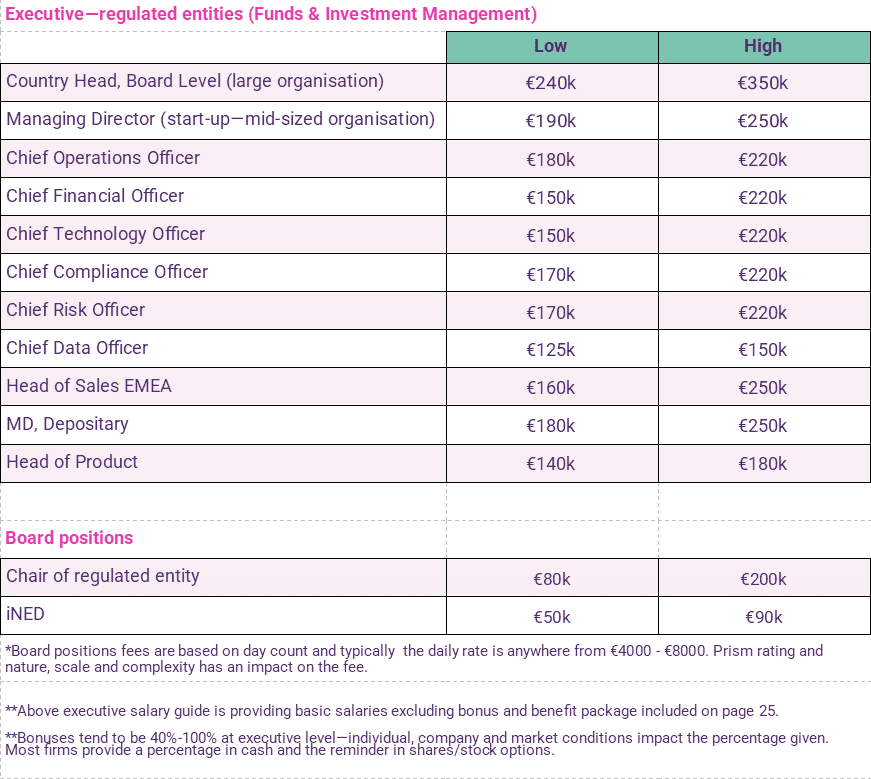
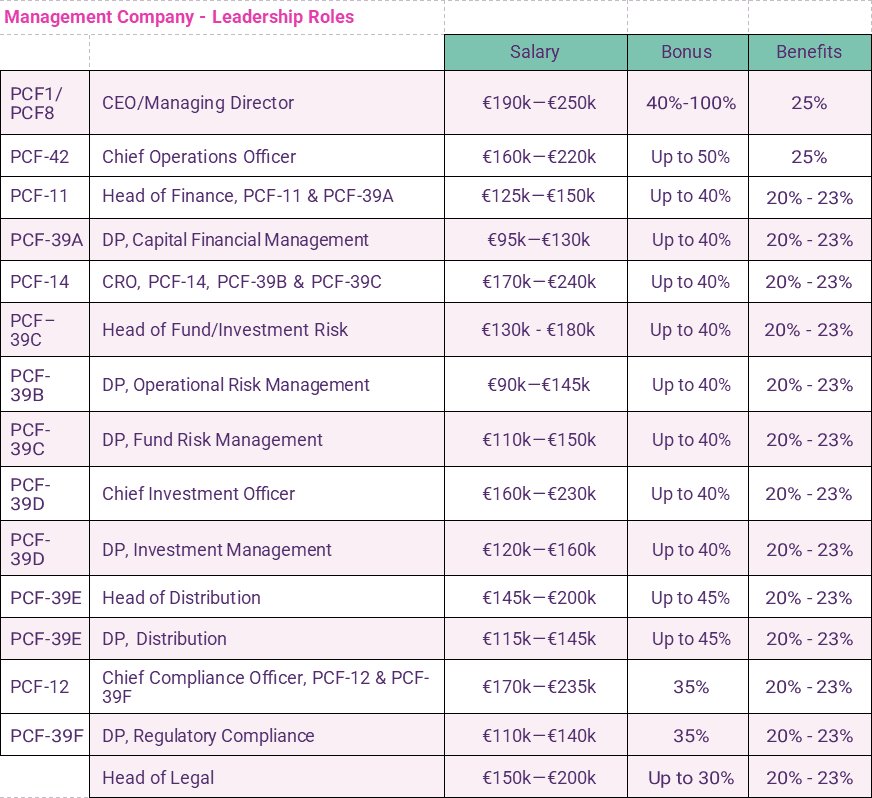
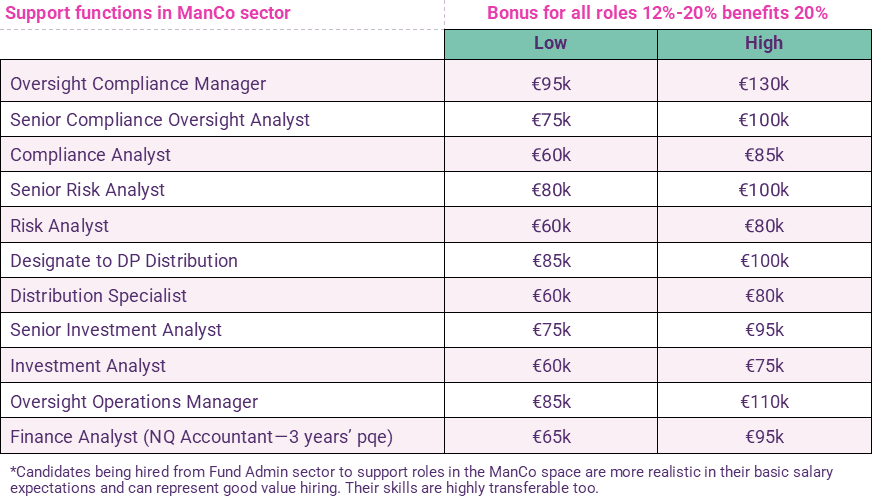
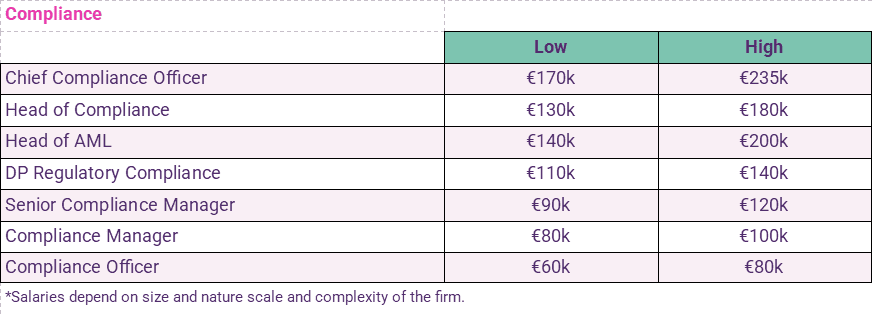
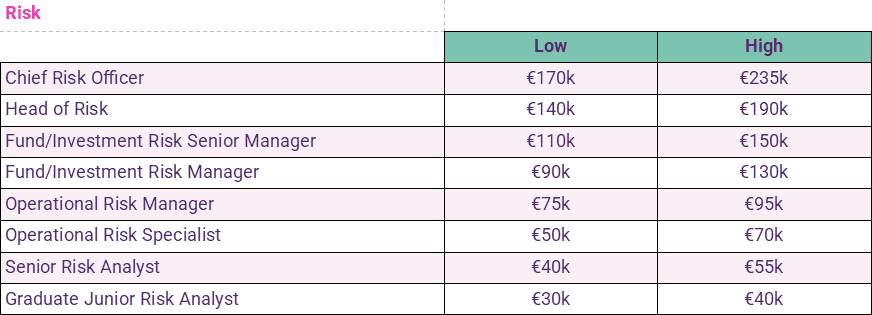
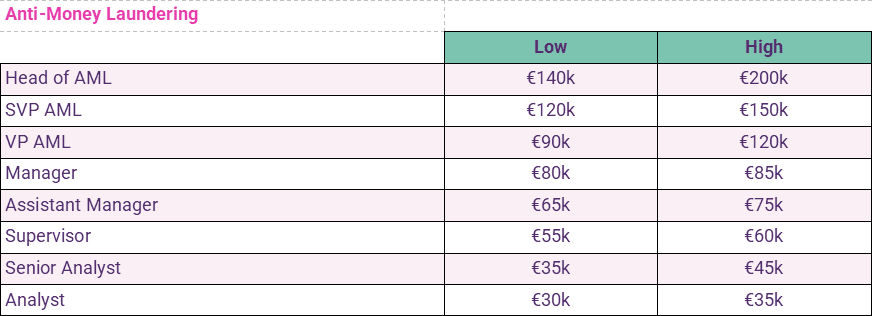
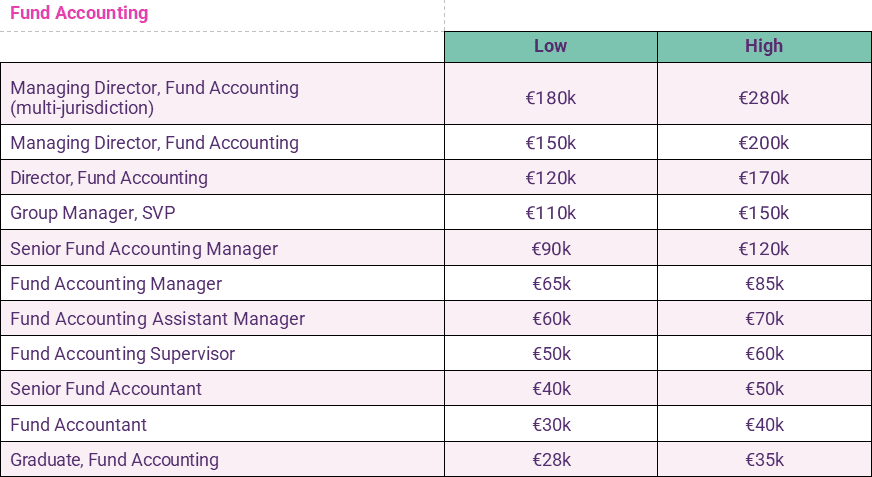
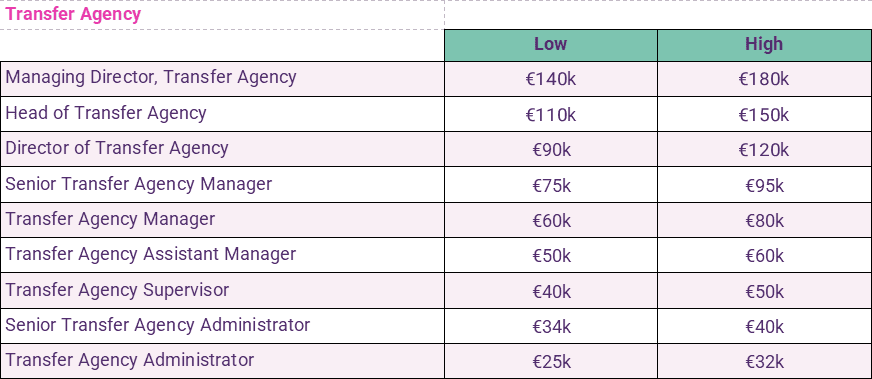
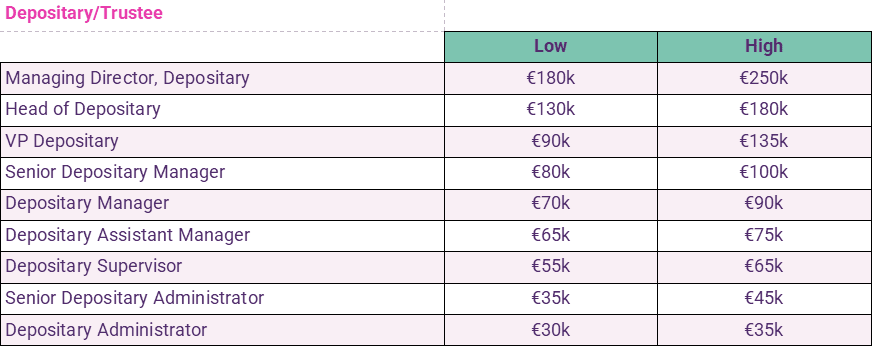
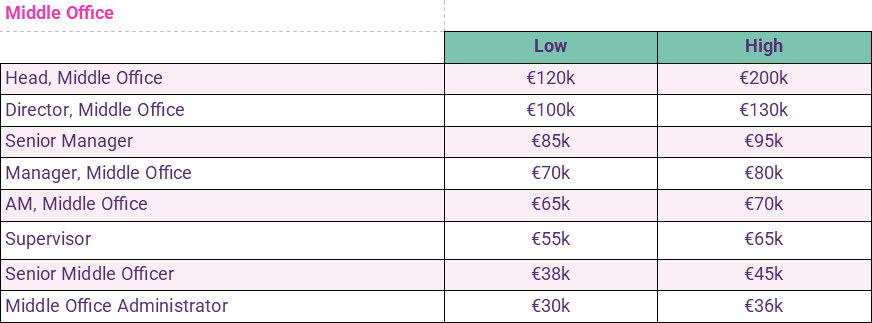
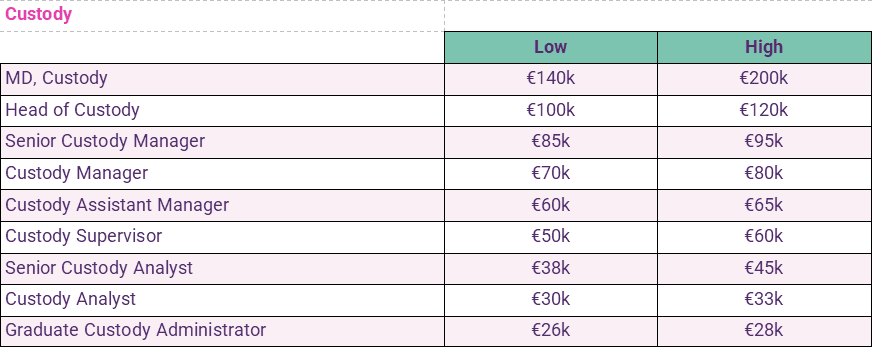


Finance Professionals in Financial Services
In 2024, newly qualified accountants in the financial services sector secured competitive salaries, starting from €60,000 and securing €72,000 depending on the role and company size. Those with experience in audit, financial reporting, or regulatory compliance, especially in investment management or insurance, may earn toward the higher end.
As accountants move into Senior Accountant or Finance Manager roles, salaries in Dublin range from €75,000 to €95,000, with opportunities for performance-based bonuses. Specialised skills in financial analysis, risk management, or FP&A are increasingly in demand, and top talent is being offered attractive compensation packages, including benefits like healthcare, pension, and hybrid work options.
Financial Controller salaries generally fall between €95,000 and €120,000, reflecting both experience and the strategic nature of the role. In larger firms or specialised sectors like private equity, salaries can exceed €120,000, with bonuses and long-term incentives.
Looking forward to 2025, clients are no longer just looking for a qualified accountant; they are seeking professionals who bring additional key skills to the table. Accountants with expertise in analytics, data analysis/data lakes, technology, Python, and AI/AI data cloud are in high demand. Businesses want accountants who can drive financial transformation and automation within their finance teams. We are also noticing a growing trend of firms seeking accountants with experience in tech companies to join financial services firms, as they’re seen as being ahead of the curve on the finance transformation journey. It’s clear that the future of accounting is evolving, and the demand for tech-savvy professionals is only growing.
For more information, contact:
Andrew Ganly, Director at andrew@thepanel.com
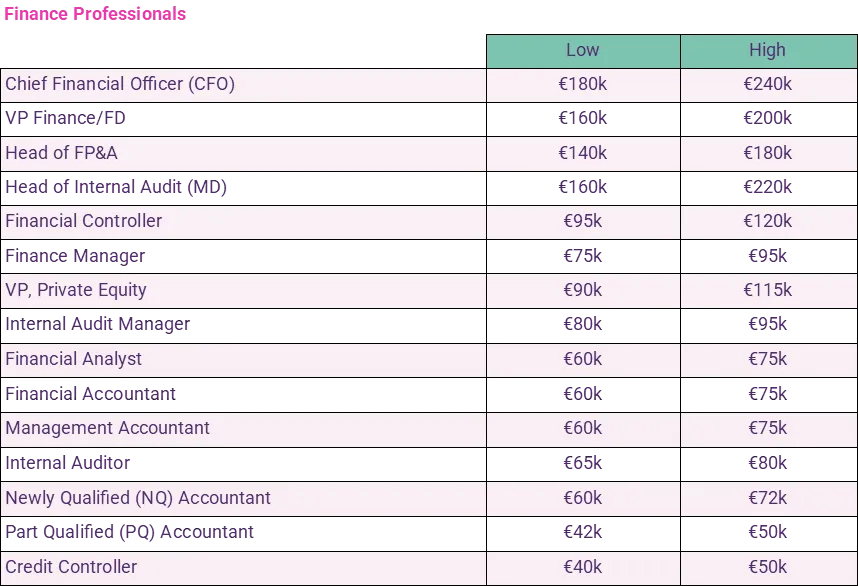
Accountancy & Tax
Overview
With a growing interest in all things tech and AI, systems knowledge and the ability to produce and present financial analytics are becoming a sought after skillset for everyday accountants across industries. Candidates investing time in upskilling with these software tools ensure they add value to their company or are attractive to a new employer.
An ever tightening market due to the continuing exodus of newly-qualified accountants to Australia, Canada, and the UAE, offers those opting to stay local a broad choice of roles. These sought after candidates are often rewarded with strong compensation packages and early promotion.
Tax candidates and sector specialists remain in high demand while smaller practices struggle to hold on against competitive multinationals and industry employers. Work/Life balance is in a battle with stronger packages as the tug of war on hybrid and office attendance continues. 2025 will begin to cement these wavering trends as the best talent still holds the advantage in a busy market.
For more information, contact our expert Accountancy & Tax team:
Paul McArdle, Joint Managing Partner at paul@thepanel.com
Andrew Ganly, Director at andrew@thepanel.com
Ailbhe Mullen, Senior Consultant at ailbhem@thepanel.com


After an extremely busy couple of years post-COVID, there has been a recalibration of the finance market to a certain extent in 2024. While certain sectors such as property, pharmaceutical, manufacturing, and FMCG have continued to thrive, others have remained more quiet.
Quarter 1 and quarter 4 have been the busiest periods of the year, with a broad choice of roles available, in particular at the Financial Controller/Head of Finance level. We have found that companies are becoming increasingly specific in their requirements, which has led to longer recruitment cycles, which often means they are missing out on top talent. As ever, companies that are more flexible with their requirements and move faster with their interview processes are more likely to secure their first choice.
With the majority of candidates working a 2/3 day week in the office, we have found there is no appetite to return to the office on a full-time basis, with many candidates believing that this is indicative of poor company culture. By ruling out a hybrid option, clients are now recruiting from a much smaller pool of relevant candidates.
With a busy end of the year and a strong pipeline of new roles for 2025, we expect a positive start to 2025.
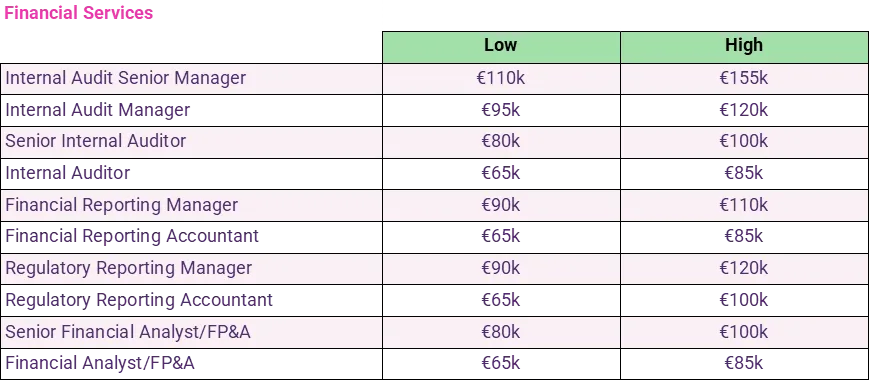
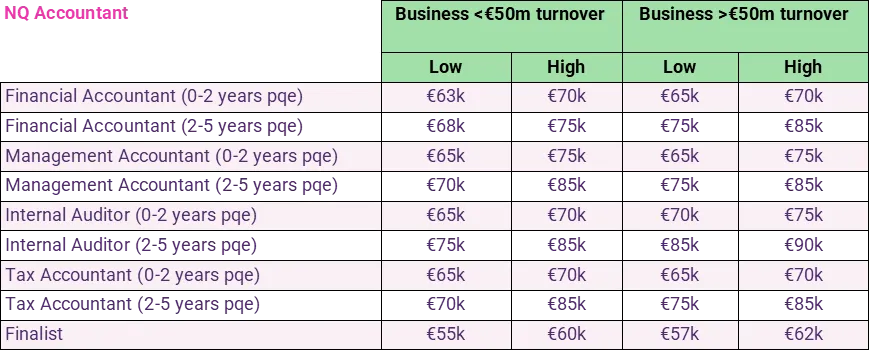
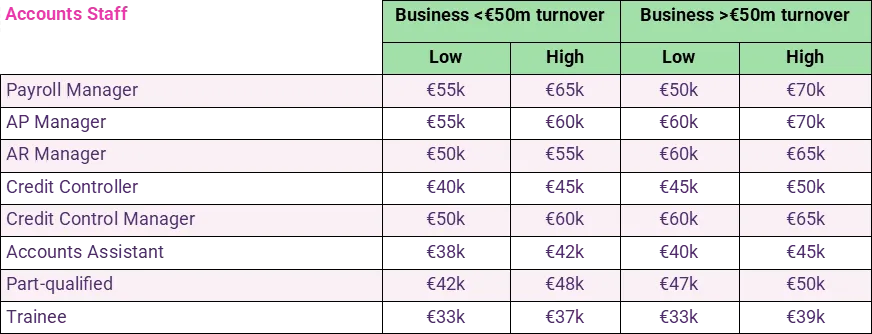
The accounts staff & part-qualified market experienced a lot of fluctuations in activity in 2024, with a strong start to the year and a relatively quiet summer. Activity began picking up significantly in August before slowing down again in subsequent months, only to regain momentum as December approached, and we expect this to continue into this year.
Throughout the year, there has been a particularly high demand for accounts assistants, reflecting businesses’ growing need for support with day-to-day financial operations.
The construction and retail industries have been especially active, driving much of this demand, as both sectors experienced robust growth and required strong financial management to sustain their operations.
Additionally, the energy sector has seen noticeable growth over the past year, further fueling the demand for skilled finance candidates
Technology, Transformation & Emerging Tech
Tech Industry Outlook for 2025
The tech sector is poised for growth in 2025, with global IT spending projected to rise by 9.3%. Software and data center investments are expected to see double-digit increases, while AI spending is set to grow at a 29% annual rate through 2028. Although layoffs continued in 2024, they appear to be slowing compared to the previous year.
Deloitte previously urged tech firms to focus on innovation—especially in cloud, AI, and cybersecurity. In 2024, many experimented with generative AI (gen AI), working to find ways to scale and monetize it. Ongoing global instability and supply chain concerns highlighted the need for balancing globalization with operational resilience. These themes remain vital as gen AI becomes more mainstream and global risks evolve.
Key Trends for 2025:
- Enhanced Risk Management: With rising cyber threats, climate risks, and geopolitical tensions, tech companies must improve risk strategies. AI introduces new vulnerabilities, and many initiatives lack proper security. Diversifying supply chains and managing climate exposure will be critical.
- Building Trust in Gen AI: While gen AI is boosting productivity and reshaping operations, concerns around data privacy, bias, and accuracy hinder adoption. Companies must address these trust issues to fully realise its benefits.
- Revolutionizing Software Development: Tech firms are leading in gen AI use for coding, unlocking major productivity gains. Emerging technologies like agentic AI—autonomous systems that complete tasks—are expected to reshape development and user experiences.
- Renewed Focus on Private Cloud: As gen AI demands grow, businesses will prioritize cost control, data privacy, and regulatory compliance, possibly shifting back to private or hybrid cloud setups.
- Strategic M&A and Partnerships: To meet complex enterprise needs, tech firms are pursuing more high-value deals and collaborations, aiming to deliver integrated, customized solutions.
- Navigating New Regulations: Upcoming global tax and compliance rules will require tech companies to upgrade reporting systems and strengthen data governance to meet evolving standards.
As the tech landscape rapidly evolves, focusing on security, trust, and adaptability will help companies drive innovation and sustainable growth in 2025.
For more information, contact our expert Technology, Transformation & Emerging Tech team:
Fergal Keys, Senior Partner at fergalk@thepanel.com
Ildiko Kiss, Business Operations Manager at ildiko@thepanel.com
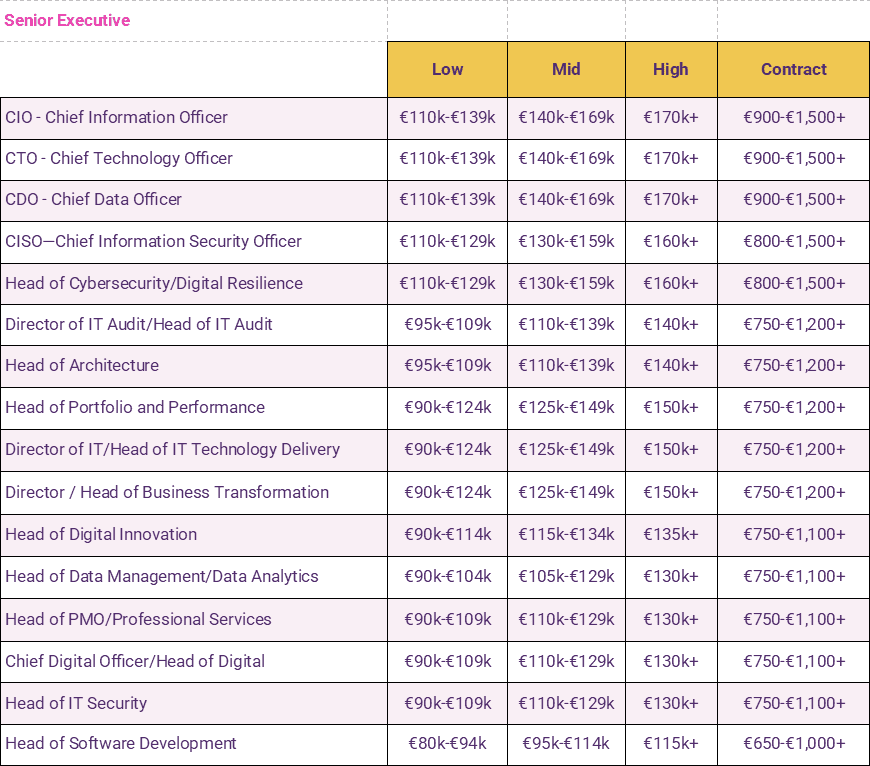
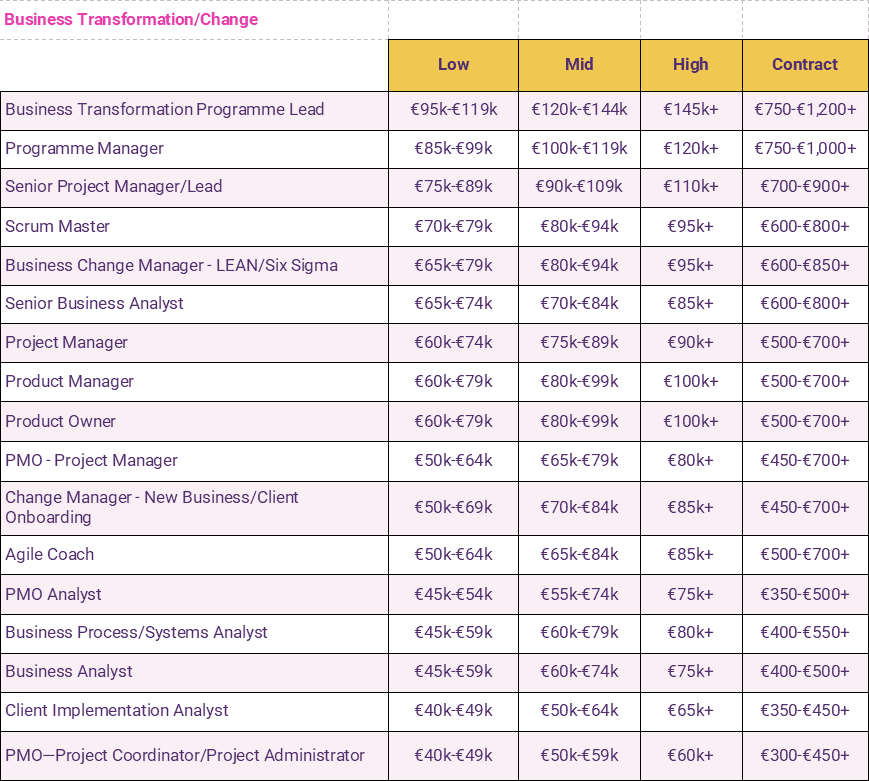
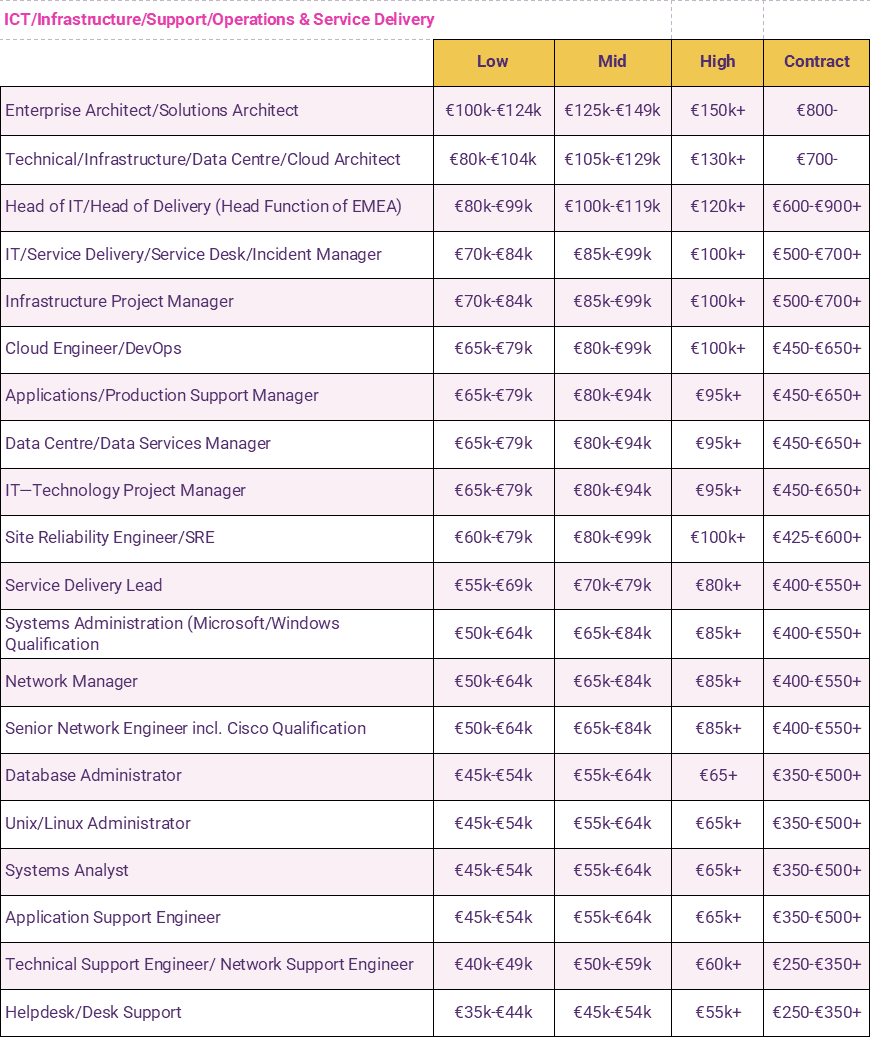

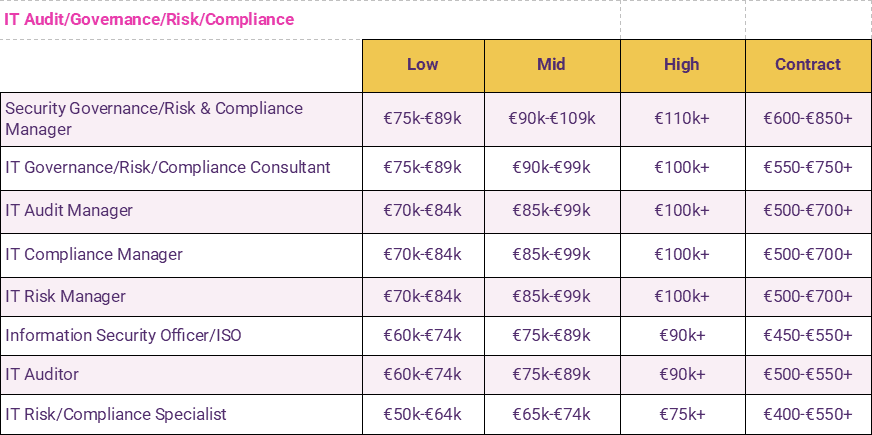
Demand for roles like Security Architects and CISOs is particularly high, with significant salary increases seen when professionals move between organisations.
These figures reflect current demand for specialised roles in cybersecurity, particularly in areas like cloud security, incident response, and automation of security operations.
For engineers with certifications like CEH, OSCP, CISSP, CISM, CISA, AWS/ Azure Security Specialty, etc., or deep expertise in high-demand areas, salaries can push toward the higher end.
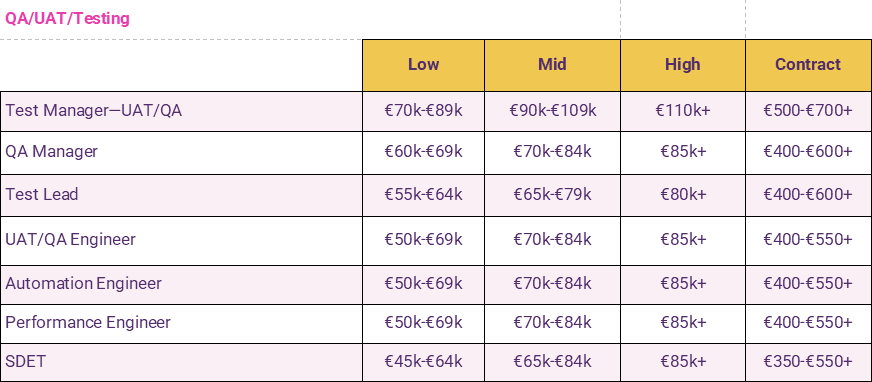

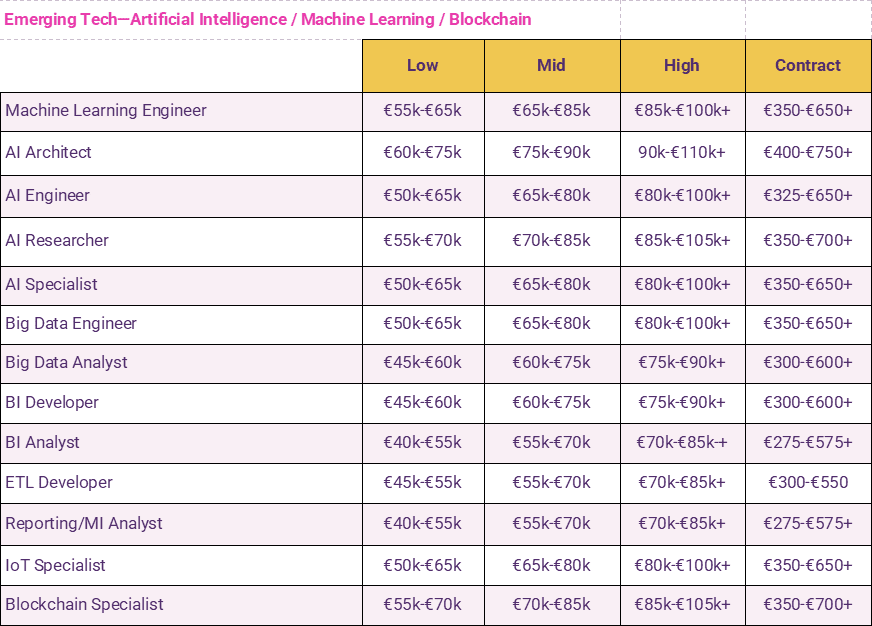
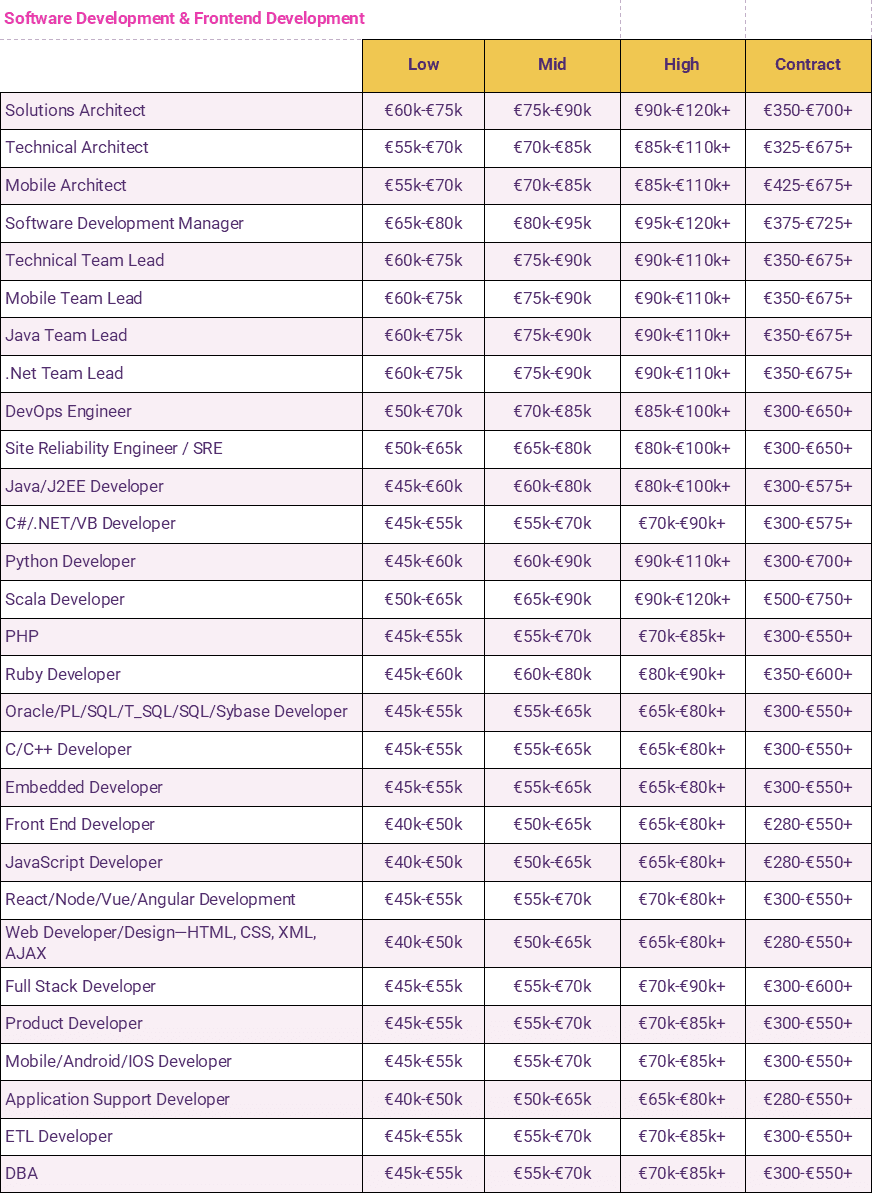
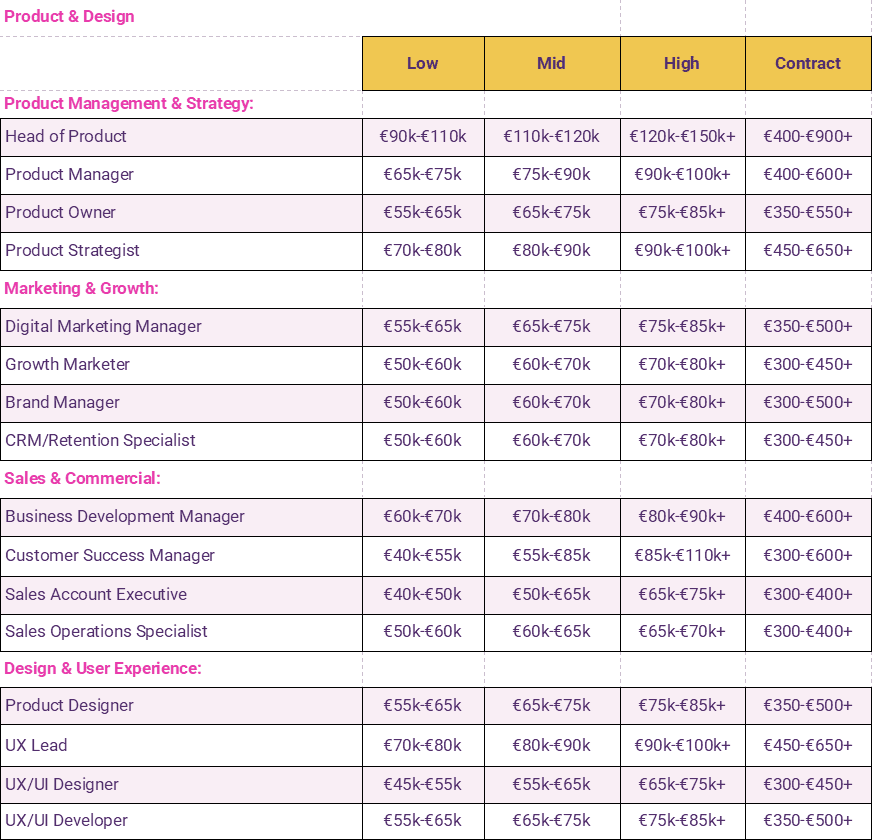
For contractors, specific rates often depend on the project’s technical demands and the contractor’s expertise. Dublin’s thriving tech hub and the presence of major tech companies make it a lucrative location for AI professionals.
Like many other countries, Ireland is facing a shortage of skilled professionals in emerging tech areas. Roles like AI Security Specialist, IoT Security Specialist, Machine Learning Engineer, and Blockchain Developer are in high demand, with a limited pool of experienced candidates.
To address the talent gap, companies are increasingly sourcing candidates internationally. Ireland’s strong position in the EU and its reputation as a tech hub make it attractive for relocation.
Non-EU professionals are also being targeted, facilitated by Ireland’s relatively welcoming visa policies for high-demand roles.
Remote work policies are being embraced by many Irish companies, especially for emerging tech roles, which helps attract candidates unwilling to relocate immediately.
Due to the shortage, salaries for emerging tech roles have risen significantly over the past few years. Visa sponsorship, competitive compensation, and relocation packages are now key differentiators for companies.
Technology, Transformation & Emerging Tech - Benefits Packages
Companies providing benefits to their employees are more likely to have higher employee retention rates, lower turnover, and a stronger talent pool available to them.
These are the key points identified by employees as valued benefits:
- Health Insurance – Tends to vary from company to company, sector to sector, but includes full/partial or membership to the company’s healthcare scheme
- Performance-related bonuses and incentives for high performers
- Pension
- Education/continuous training
Employers need to be aware of how important the overall remuneration package is in order to attract and retain their staff.
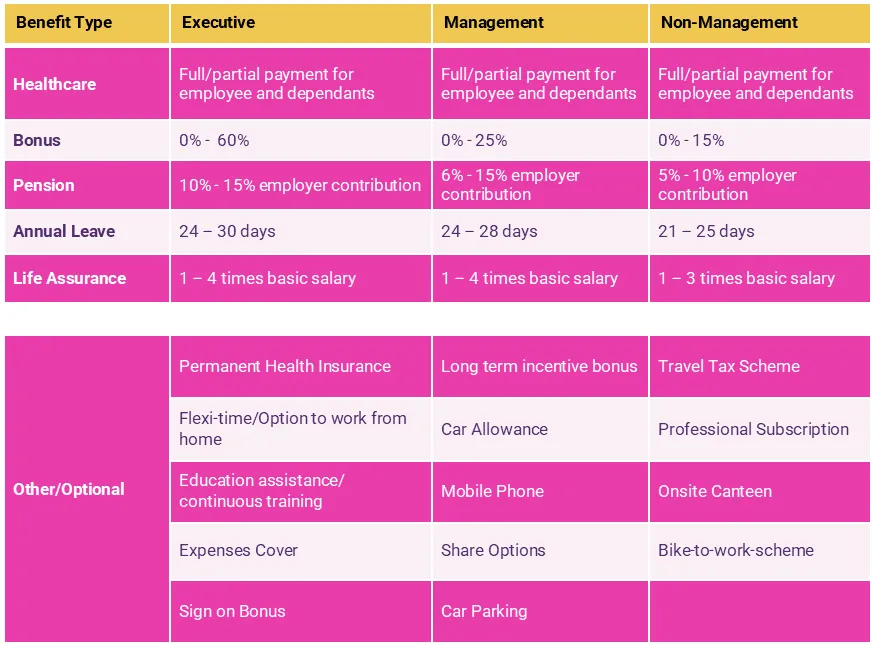
Legal + Company Secretarial
Overview
The Dublin legal market maintained its steady momentum throughout 2024. For example, on the in-house front, I placed a Head of Legal/General Counsel with two new entrant pharmaceutical organisations, a GC with a global US beverage manufacturer who is expanding their business in EMEA, and a Head of Legal with a private equity organisation. Notably, all of these businesses, new to the Irish market, strategically choose Dublin as the base for their European legal counsel, leveraging the city’s deep pool of experienced legal talent.
2024 also witnessed more mergers among prominent law firms, including LK Shields and Byrne Wallace, and FOD and Vincent & Beatty. Rumours of a potential merger between William Fry and Eversheds further underscore the market’s maturation and firms’ efforts to expand their service offerings.
While some law firms experienced talent attrition to in-house teams and London-based firms, they continued to hire across key practice areas such as corporate, investment funds, financial regulation, privacy, and technology. Larger firms and in-house teams increasingly sought lawyers with expertise in sustainability, environmental law, and green finance, reflecting the growing importance of ESG considerations. This trend, coupled with the anticipated rise of AI, is poised to drive demand for niche expertise in 2025.
For more information, contact our expert Legal + Company Secretarial Partner:
Sarah Kelly, Partner at sarahk@thepanel.com

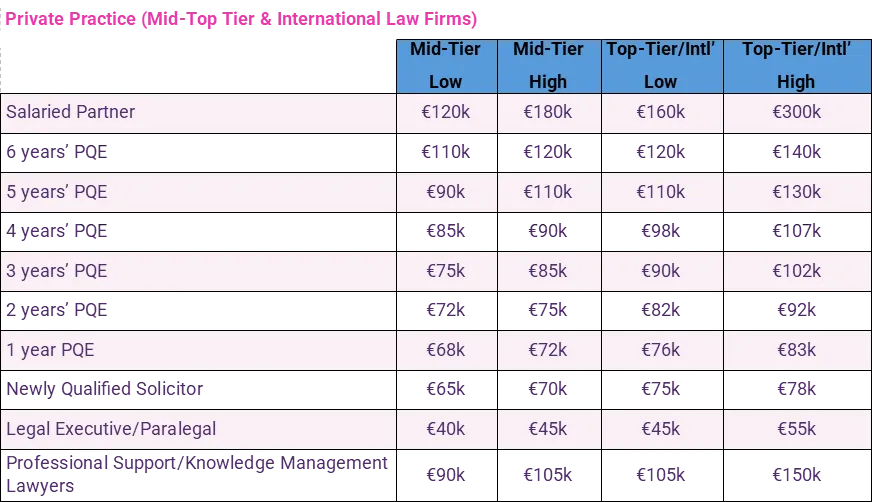



Banking, Treasury & Insurance
Overview
In the overview for The Panel’s 2024 Salary Guide, we said that in 2024 there would “be a slight softening in overall vacancies, a more circumspect employee market and a little bit more power getting back into the employment decisions of employers.” The outcome for 2024 ended up being as we suggested it would be, with candidates more cautious about moving jobs and employers having a little bit more of the upper hand when it comes to hiring. We also came to the following conclusions in the 2024 salary guide:
- Heed Heraclitus (Namely that the only constant in life is change)
- Moderate salary increases in 2024
- Adapt to a balanced home/office working environment
- Embrace AI (but don’t let it boss you)
- Be inclusive
- Enjoy life – you only get one shot at it!
We think we could easily bounce our 2024 conclusions into 2025! With inflation finally back under control and averaging circa 1%, combined with a softening labour market, we have seen modest salary increases in 2024 and would expect very modest salary increases again in 2025, in the low single digits. Hiring within the domestic banks this year has been focused on the junior to mid management range, with ongoing reductions in overall staff numbers. In general, hiring within both domestic and international banks in Ireland has been broadly static, with the focus on backfilling where required as opposed to expansion. A small number of international banks did expand their operations in Ireland in 2024, but they were the exception rather than the norm. Demand remained strong for IT, compliance, and risk staff this year within banking.
On the corporate treasury side, there were few senior vacancies across the year, however, the junior treasury market was very buoyant with strong demand from employers for staff with 2 to 5 years direct treasury experience.
For more information, contact our Banking, Treasury & Insurance Partner:
Alan Bluett, Partner at alan@thepanel.com
Farah Daoub, Recruitment Resourcer at farah@thepanel.com
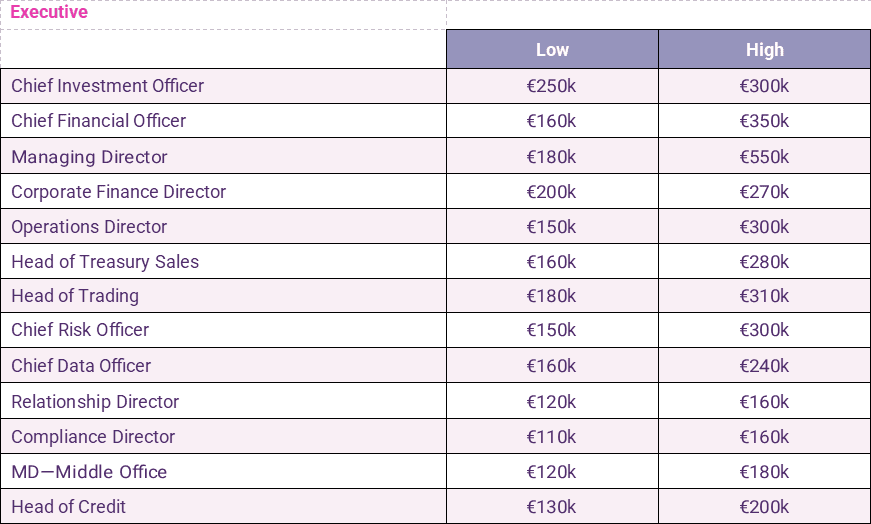
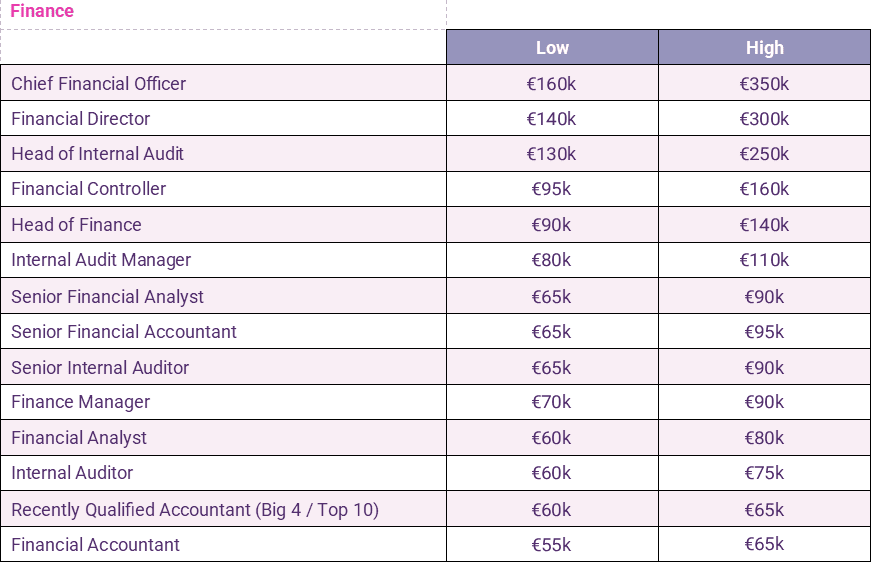
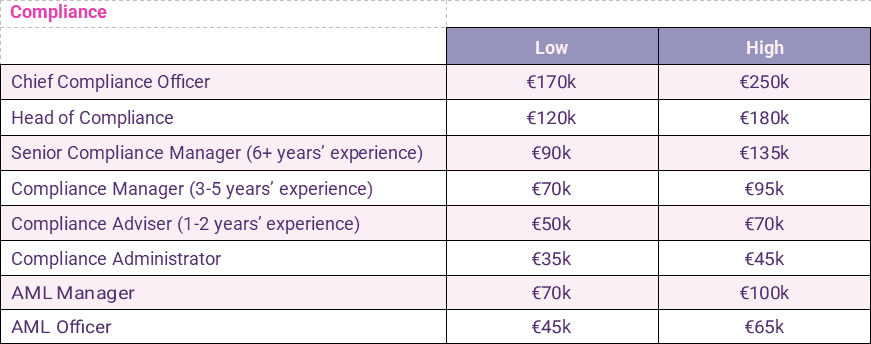
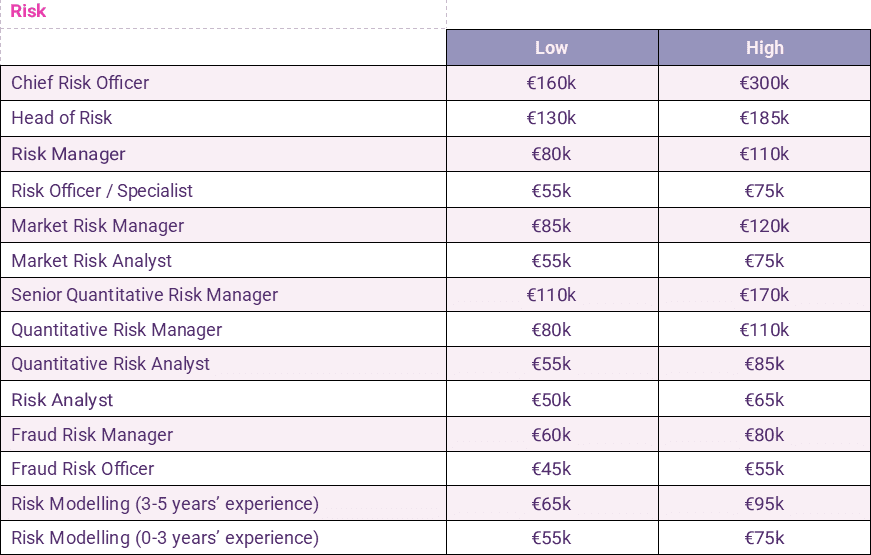
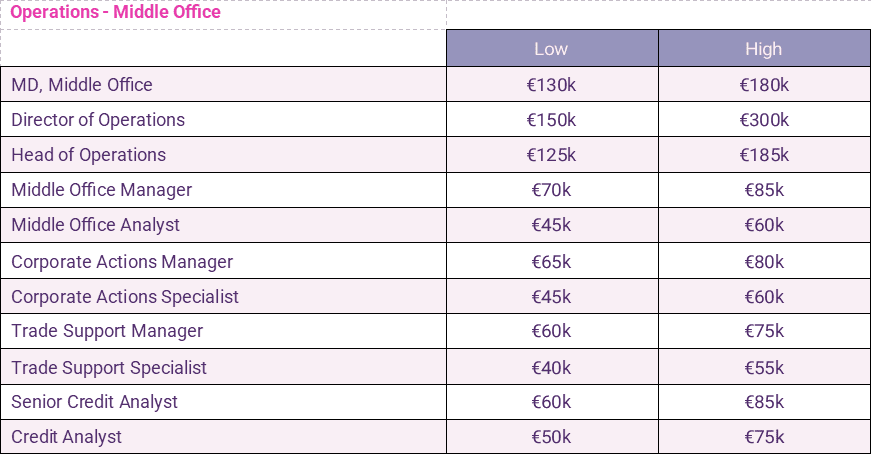
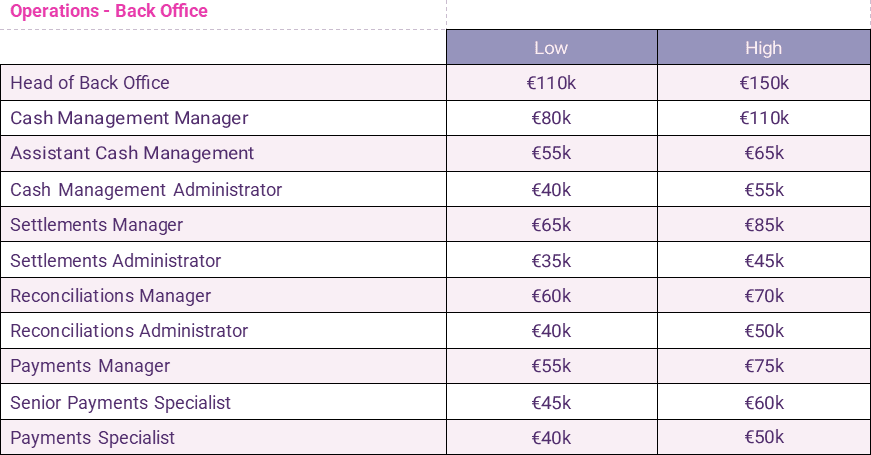
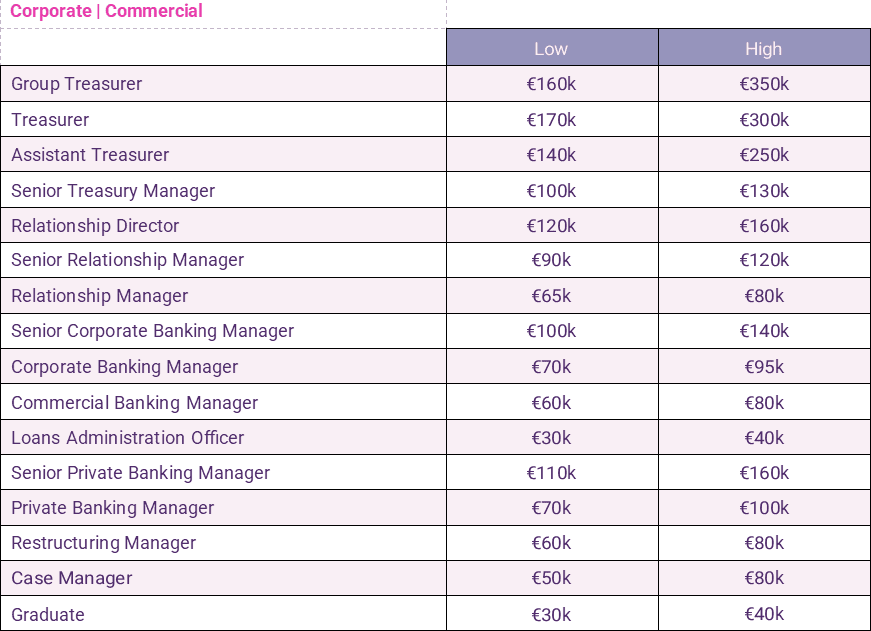
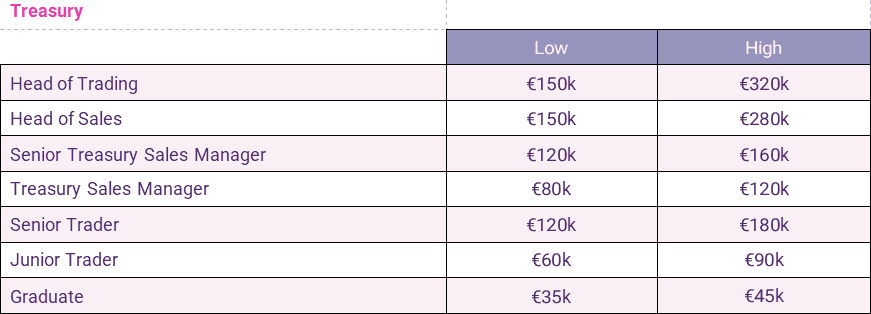
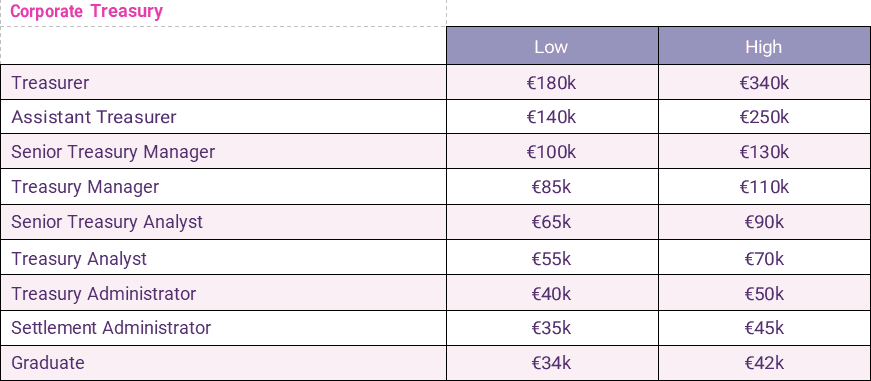
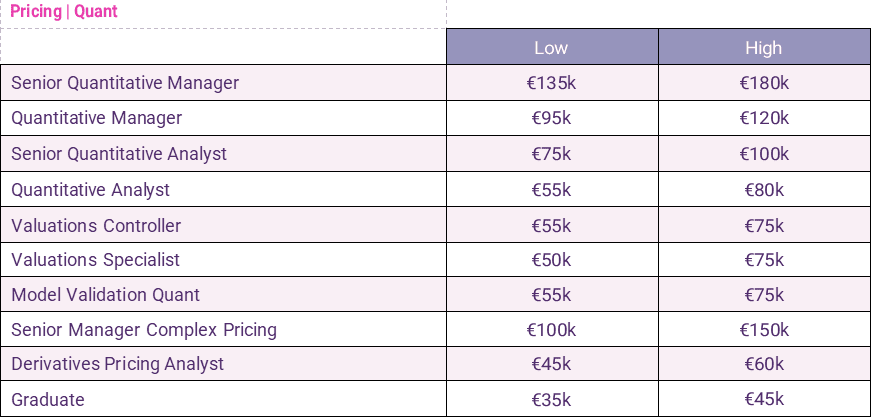
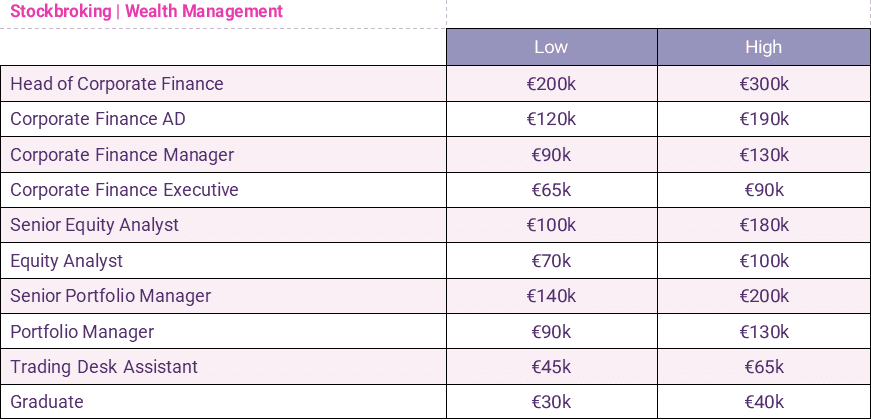

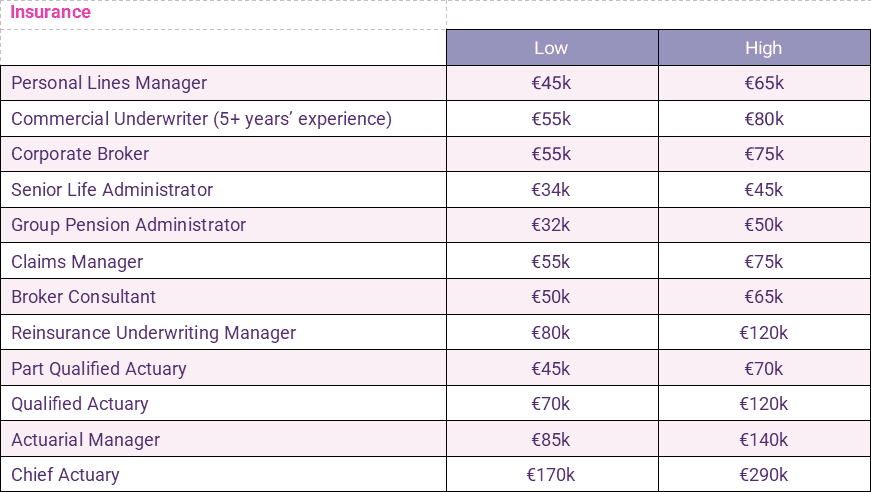
Fintech
Fintech Landscape in Ireland
Ireland’s payments sector is experiencing significant growth, particularly in electronic money (e-money) and cryptocurrency services. According to Fintech Ireland, as of 10th January 2025, Ireland has 85 fintech firms – 28 EMIs, 21 Payment Institutions, 22 VASPs, 7 open banking, and 7 crowdfunding providers. Rippling recently announced receiving their authorisation as Ireland’s 28th Electronic Money Institution (EMI). This expansion reflects a broader trend across Europe, where the sector is in a growth phase, marked by a significant rise in the number of firms operating and their activity levels.
In the cryptocurrency domain, Ireland has become an attractive destination for crypto companies. Major players like Coinbase and Gemini have established a presence in the country, recognising its supportive political environment and the presence of a globally respected regulator. Coinbase, for instance, has chosen Ireland as its EU MiCA hub, aiming to serve the European market under a unified regulatory framework.
The implementation of the Markets in Crypto-Assets Regulation (MiCA) in the European Union is set to harmonize crypto-asset regulations across member states, fostering greater clarity and stability within the crypto ecosystem. For payments and e-money firms involved in crypto activities, MiCA requires careful consideration, including obtaining specific licenses for crypto-asset services and implementing robust anti-money laundering (AML) and combating the financing of terrorism (CFT) controls tailored to the specific risks associated with crypto transactions.
The growth of the fintech sector has led to a surge in demand for C-suite executives with specialised expertise in this space. As fintech companies expand, there is an increasing need for seasoned professionals to fill key leadership roles, including CEO, CCO, CRO, CFO, COO, CTO, and CLO. These companies also need a skilled team to support their C-suite executives as they focus on expanding the business and serving an international market. There has also been a growing demand for independent non-executive directors (iNEDs) with fintech expertise to join boards, helping meet regulatory requirements set by the CBI. These professionals provide essential support, challenge, and guidance as companies scale their operations. The rapid expansion of fintech is reminiscent of the post-Brexit boom in the investment management industry, creating intense competition for top talent within this fast-evolving sector.
Overall, Ireland’s payments sector is evolving rapidly, with a growing number of firms entering the market and a regulatory landscape adapting to new technologies and services. This dynamic environment presents both opportunities and challenges for businesses operating within the sector.
For more information, contact:
Anne Keys, Joint Managing Partner at anne@thepanel.com
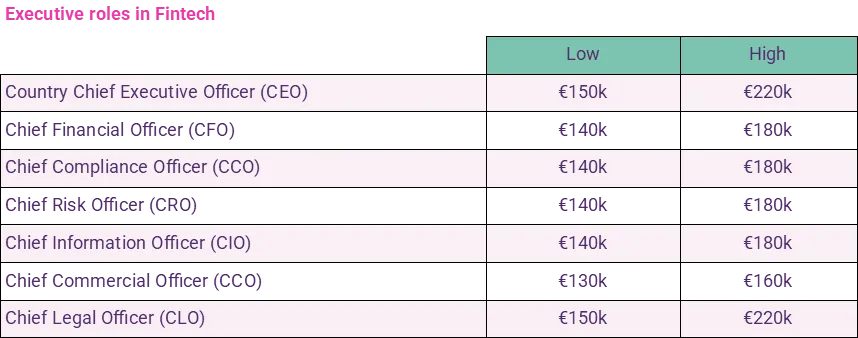

HR + Business Support
Overview
2024 was a bustling year for The Panel’s HR & Talent practice. We successfully filled key positions for our clients, including Chief People Officer, HR Manager, Senior HR Business Partner, Total Reward Manager, HR Generalist, HR Administration, Executive Assistant, and Personal Assistant to Executive Team and Office Managers, among others.
We observed a notable increase in demand for Senior HR Business Partner contracts. Flexibility/Hybrid working arrangements remain a top priority for candidates, with nearly all seeking a balanced approach.
The Panel offers top talent in all areas of HR and business support to organisations in Financial Services and in Industry.
Trends for 2025
In 2025, companies must adapt to evolving HR trends to stay competitive. To attract and retain top talent, they need to be agile and people-focused.
Flexibility and hybrid work models continues to dominate, becoming more permanent even as more return to the office.
Artificial Intelligence (AI) will play a significant role in recruitment and employee analytics, while maintaining a human touch is crucial.
Employee well-being will expand beyond mental health to include financial literacy and work-life integration.
Learning and Development (L&D), upskilling, and reskilling will be essential for employee retention and growth, especially to meet the demand of digital transformation and sustainability initiatives. Equality and inclusion will remain key priorities.
For more information, contact our HR + Business Support recruiter:
Ailbhe Mullen, Senior Recruitment Consultant at ailbhem@thepanel.com
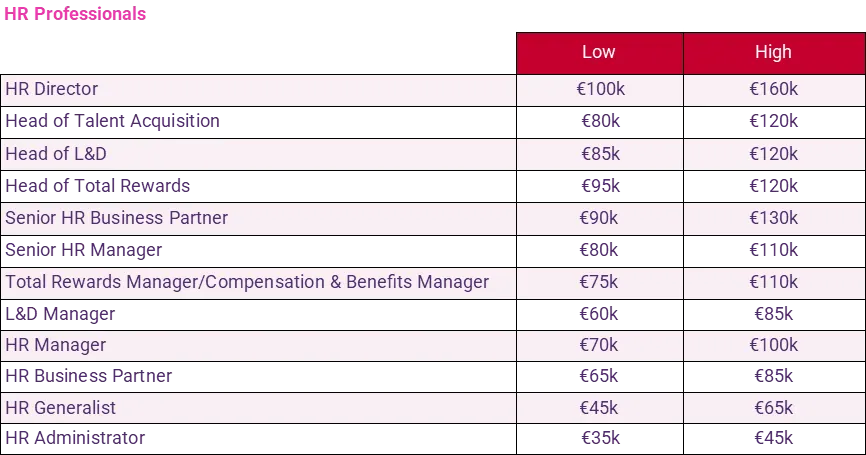
The Panel’s HR & Talent desk also works with clients across Business Support and can assist you when sourcing for talent such as Executive Assistants, Office Manager, and Operation/Business Manager.

ESG & Sustainability
Overview
We have experienced a surge in demand in 2024 for ESG/Sustainability talent across all sectors, which will continue through 2025.
LinkedIn data recently revealed that the percentage of job postings requiring green skills in Ireland is one of the highest internationally, with one in eight (12.4%) Irish jobs now requiring at least one green skill, another report recently issued by the IDA, encourages all businesses and educators to embrace and invest in green skills development to prepare for Ireland’s low-carbon future.
The global demand for green skills is rapidly outpacing supply, with estimates indicating that by 2050, twice as many jobs will require green expertise than there will be people qualified to fill them. Demand for green talent in Ireland grew by over 22.1% last year—well above the global average of 11.6%—demonstrating a strong and immediate need to upskill the workforce to keep up with the demands of the green economy.
Green skills are most concentrated in industries like utilities, construction, and manufacturing, with skills such as environmental impact assessment and operational efficiency among the fastest growing in demand. However, the need for skills in areas like sustainable supply chain management, pollution prevention, and renewable energy is spreading rapidly to other industries, such as professional services, financial services, and technology.
The focus in 2025 will be on CSRD reporting leads and building sustainability teams ahead of the reporting deadlines coming in 2026.
For more information, contact our HR + Business Support recruiter:
Darina Heavey, Senior Recruitment Consultant at darina@thepanel.com

Aircraft Leasing
Overview
We have seen an increased need for professionals with experience in fleet planning, aircraft asset management, and technical leasing roles as companies focus on modernising fleets and adopting sustainable technologies. Growing demand for specialists in aviation law, contract negotiation, and regulatory compliance due to heightened global scrutiny and complex lease agreements.
We have placed several marketing managers and contract management specialists in recent months. Demand for these kinds of positions is continuing.
The various aircraft leasing events happening in Dublin during the year highlighted the fact that environmental sustainability is becoming increasingly important in the aviation industry. Aircraft leasing companies are investing in more fuel-efficient aircraft and exploring alternative fuels to reduce carbon emissions. This trend is expected to continue in 2025, with aircraft leasing companies focusing on environmental sustainability.
For more information, contact our Aircraft Leasing recruiter:
Darina Heavey, Senior Recruitment Consultant at darina@thepanel.com
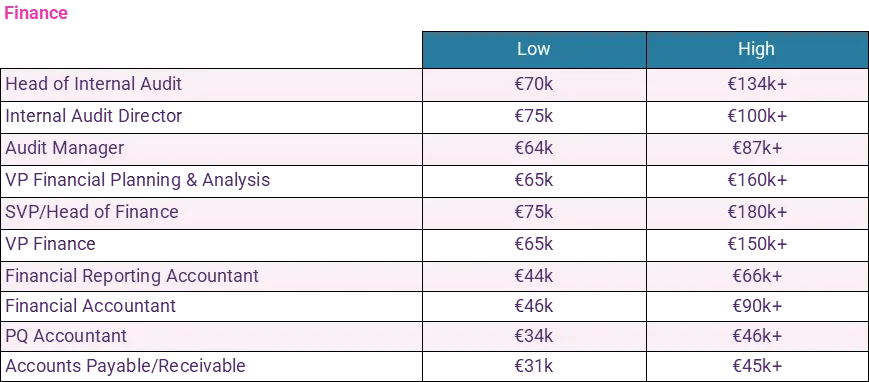



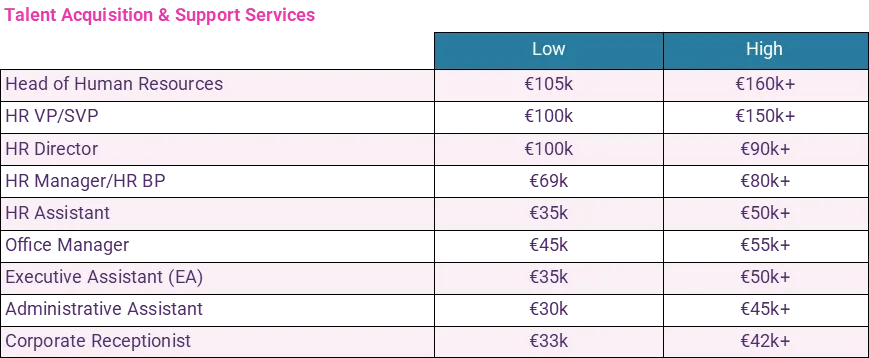



Benefit Packages
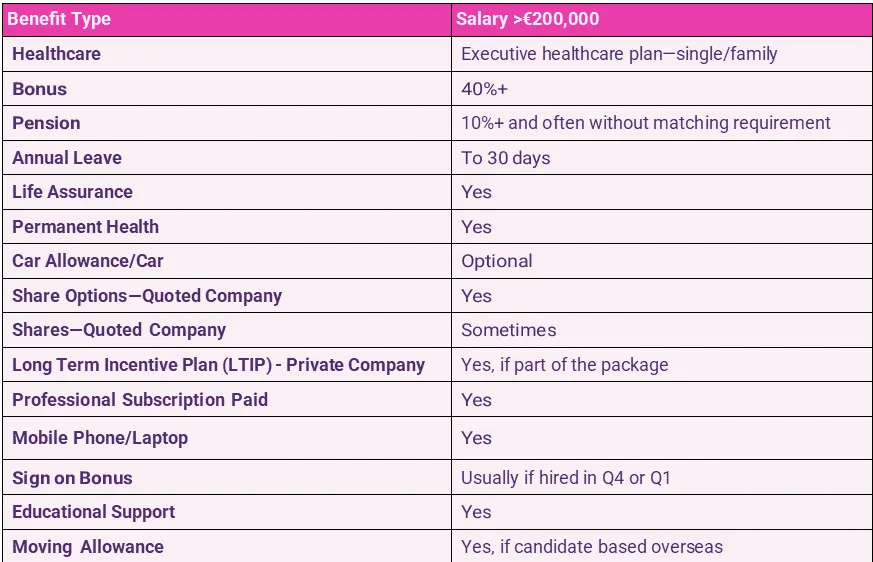
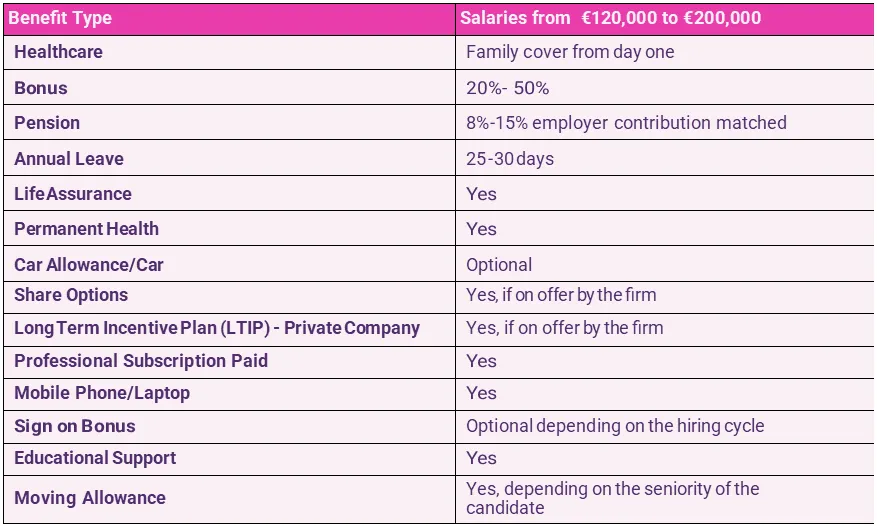
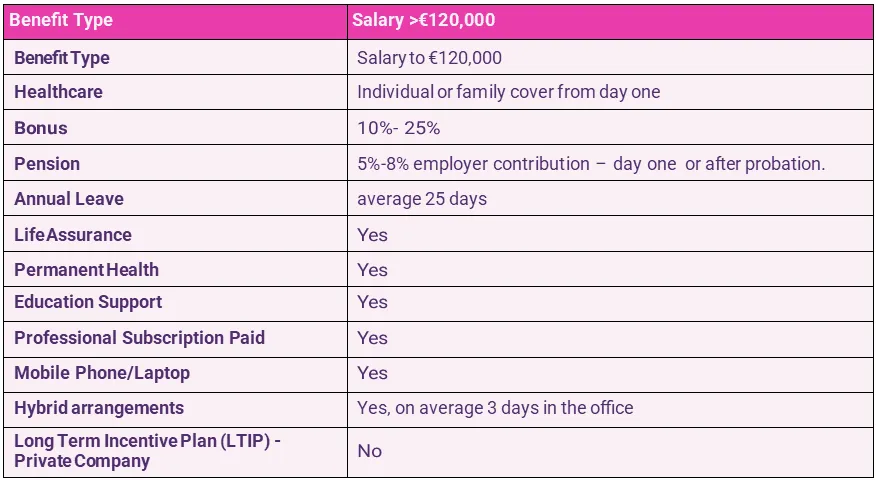
Candidate Sentiment Survey
The latest edition of The Panel’s Candidate Sentiment Survey provides valuable insights into shifting workplace trends, employee expectations, and the evolving job market. With responses from 1,796 professionals across various industries, the survey highlights key themes, including workplace preferences, career growth opportunities, commuting challenges, and employer-employee dynamics.
As companies push for a return to the office, employees remain firm in their demand for flexibility, raising important questions about the future of work. Here’s a quick look at what’s on the minds of candidates right now.
- Work Preferences & Office Presence: While more employers are encouraging office returns, only 3% of candidates want full-time office work. Hybrid remains the preferred model, with three days in the office being most popular.
- Impact on Career Growth: 43% of candidates believe office presence helps with promotions, though most don’t see remote work as a disadvantage. Concerns about “proximity bias” were raised.
- Commuting & Housing Affordability: 80% of candidates can afford to live within commuting distance, but rising housing costs impact job choices. One in eight candidates considers their commute a reason to change jobs.
- Shifting Job Market Power: Candidates see power shifting towards employers, with fewer roles available despite talent shortages. Optimism about career progression has declined for the second consecutive year.
- Workplace Culture & Employer Values: Many employees feel disconnected from company culture, with nearly half sceptical about employers living up to their stated values, especially during layoffs.
Overall, the survey reveals a workforce navigating change with a mix of adaptability and scepticism. While employers are gaining leverage in the job market, employees continue to prioritise work-life balance, career progression, and company culture.
The disconnect between employer expectations and employee preferences underscores the need for businesses to rethink their approach to flexibility, engagement, and value-driven leadership to attract and retain top talent.
In the last three years...
1,769 out of 1,796 answered this question
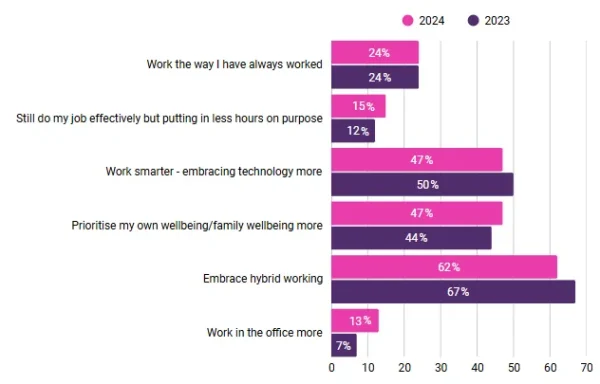 The respondents could choose every relevant option. The biggest change is in the “Work in the office more” option, which has doubled from seven per cent last autumn to 13 per cent now. This reflects what we are seeing in The Panel, with more employers looking to get their employees back into the office.
The respondents could choose every relevant option. The biggest change is in the “Work in the office more” option, which has doubled from seven per cent last autumn to 13 per cent now. This reflects what we are seeing in The Panel, with more employers looking to get their employees back into the office.
The other answers are broadly in line with our 2023 survey, with one in four still working the way they have always worked.
Which of these statements best reflects where you would like your place of work to be today?
1,764 out of 1,796 answered this question
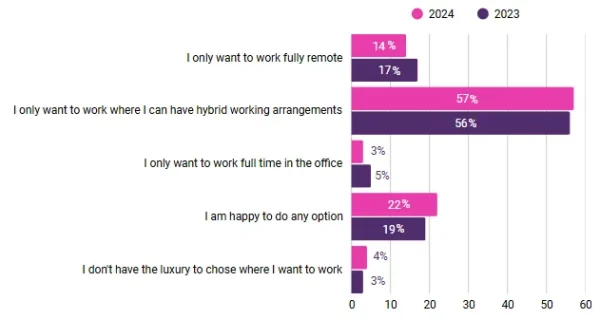 With more employers looking for their employees to return to the office, it is interesting that only three per cent of candidates would choose to work full-time in the office. This is down from five per cent in our last survey, a 40 per cent drop.
With more employers looking for their employees to return to the office, it is interesting that only three per cent of candidates would choose to work full-time in the office. This is down from five per cent in our last survey, a 40 per cent drop.
The other answers are relatively unchanged from the 2023 survey. More people are flexible about their working arrangements, with 22 per cent “happy to do any option,” up from 19 per cent previously.
My employer...
1,723 out of 1,796 answered this question
 The answers to this question are consistent with the 2023 survey. Over half of the respondents are still left to choose where they work. We are surprised at this finding; we expected it to be lower, based on the fact that anecdotally, we are seeing employers more insistent on people returning to the workplace.
The answers to this question are consistent with the 2023 survey. Over half of the respondents are still left to choose where they work. We are surprised at this finding; we expected it to be lower, based on the fact that anecdotally, we are seeing employers more insistent on people returning to the workplace.
How many days does your employer require you to come into the office?
614 out of 1,796 answered this question
 We asked the candidates not working five days in the office how many days they would work there.
We asked the candidates not working five days in the office how many days they would work there.
Three days in the office is still the most popular option, up 10 per cent (2024 — 45 per cent compared to 41 per cent last year). Two days in the office decreased from 37 per cent last year to 31 per cent today.
One to watch is the four days in the office, up about 25 per cent from last year (11 per cent in 2023 to 14 per cent currently).
I feel that colleagues who work three days or more in the office...
1,701 out of 1,796 answered this question
This is a new question in the Autumn survey. We wanted to assess candidates’ thoughts about “being present” in the office and whether they felt it influenced their promotion prospects.
A sizeable minority, 43 per cent, believes it positively influences their promotion chances. Most respondents, however, do not see working remotely as detrimental to their chances of promotion.
At the moment my physical working arrangements are...
1,704 out of 1,796 answered this question
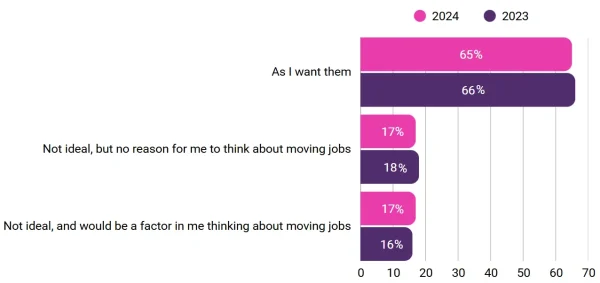 These findings are consistent with the 2023 findings. Two-thirds of respondents are working where they want to. One in six of our respondents is looking to move roles because their working arrangements don’t suit them, something employers need to be cognisant of.
These findings are consistent with the 2023 findings. Two-thirds of respondents are working where they want to. One in six of our respondents is looking to move roles because their working arrangements don’t suit them, something employers need to be cognisant of.
The other answers are relatively unchanged from the 2023 survey. More people are flexible about their working arrangements, with 22 per cent “happy to do any option,” up from 19 per cent previously.
In the past three years have you had to change jobs due to a lack of affordable accommodation commutable to your employer?
1,717 out of 1,796 answered this question
This is another new question in our 2024 survey. It is encouraging that over 80 per cent of the respondents can afford to live within a commutable distance of work. One in twelve respondents, however, is directly affected by the affordability of housing, while one in ten respondents is working remotely or not working.
Currently, my commute time/expense is...
1,706 out of 1,796 answered this question
I feel the balance of power in the present job market is...
1,698 out of 1,796 answered this question
 The most significant swing in the sentiment of the respondents we recorded in this survey is that respondents clearly see the power in the job market transferring to employers.
The most significant swing in the sentiment of the respondents we recorded in this survey is that respondents clearly see the power in the job market transferring to employers.
This backs up what we see in The Panel. While the country is close to full employment, candidates have fewer roles to choose from. However, despite a talent shortage, clients are beginning to get a better choice of candidates, and they can get more people to work in the office more days than previously.
As we can see from previous answers, there is still significant resistance to working in the office full-time. However, the dynamic is changing in favour of the employer. The drop from 37 per cent to 25 per cent in people believing that the power is with the employee is significant. The rise in respondents who see the power with the employer has risen significantly from 31 per cent in 2024 to 44 per cent today.
I think the next 12 months...
1,679 out of 1,796 answered this question
 Overall, candidates are less optimistic about their careers: 37 per cent believe the next 12 months will be good for them, down from 42 per cent in 2023. This figure was at 50 per cent in our 2022 survey, so a steep decline in two years.
Overall, candidates are less optimistic about their careers: 37 per cent believe the next 12 months will be good for them, down from 42 per cent in 2023. This figure was at 50 per cent in our 2022 survey, so a steep decline in two years.
This trajectory is mirrored by the candidates who answered that progressing their careers in 2025 will be difficult, at 18 per cent, up from 14 per cent last year and 12 per cent in 2022, a 50 per cent increase in two years.
From my own career prespective, the next 12 months have me in...
1,686 out of 1,796 answered this question
 The direction of travel is the same as the answers to the last question: 40 per cent of people are more pessimistic about the year ahead than last year (2023 – 10 per cent to 14 per cent today). Those who are optimistic about the next 12 months have fallen from 43 per cent in 2023 to 35 per cent today.
The direction of travel is the same as the answers to the last question: 40 per cent of people are more pessimistic about the year ahead than last year (2023 – 10 per cent to 14 per cent today). Those who are optimistic about the next 12 months have fallen from 43 per cent in 2023 to 35 per cent today.
Has a negative workplace culture ever been the main reason you have left a job?
1,658 out of 1,796 answered this question
If you work in an office less than 2 days per week, do you find it more difficult to connect with your organisations culture?
1,592 out of 1,796 answered this question
I believe that my employer...
1,626 out of 1,796 answered this question
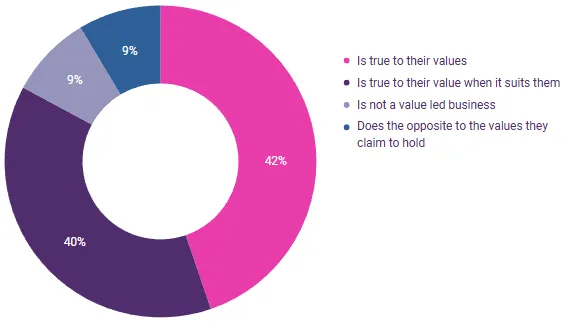 Another new question this year. In The Panel, we are increasingly dealing with candidates being let go by their employers, mainly from the multinational sector. Many of them feel that their stated company values were ignored when it suited their employer, and we wanted to measure whether this was a widespread belief.
Another new question this year. In The Panel, we are increasingly dealing with candidates being let go by their employers, mainly from the multinational sector. Many of them feel that their stated company values were ignored when it suited their employer, and we wanted to measure whether this was a widespread belief.
40 per cent feel that their employers’ company was true to their values only when it suited them, and 9 per cent feel their company acts opposite to their espoused values. This means that one in two respondents is sceptical about company values, a significant cohort.
That less than half of the respondents (42 per cent) believe their employer is true to their values is a poor reflection on employers in general.
We would like to thank all the respondents for filling out the survey. Special thanks to those who chose to add comments; these were particularly illuminating.
The Panel RPO Offering
In Recruitment Process Outsourcing (RPO), companies transfers all or part of its recruitment processes to The Panels RPO specialist team.
The RPO team with the support of our network acts as an extension of that client’s HR department. This can be done either off-site or on-site. As the RPO provider we take full ownership of all hiring duties and are fully accountable for the results we deliver.
RPO providers are often sought out for high-volume recruitment including short and medium roles on a project-to-project basis, as well as fully replacing all internal recruitment in an organisation.
The RPO provider can take responsibility of part or all the following:
- Candidate name generation and sourcing
- Recruitment marketing and/or advertising strategy
- Candidate screening
- The entire interview processes.
- Testing and selection
- Salary negotiation
- Various background checks
- Placement and onboarding
- Reporting & data analytics
- Assist you build your own Talent Recruitment Team
The Panel as your RPO Partner could also be responsible for introducing are own technology and reporting. This can be a big advantage for clients, particularly for smaller companies who may not have access to similar technologies or who are inward investment companies.
All the above services can be increased, modified or reduced throughout the process depending on a client’s needs.
These means costs can go down when your hiring needs go down and the RPO provider can adapt to your specific business needs.
While the traditional agency model offers as much support as the client needs, RPO acts as an extension of the internal recruitment operations of the business by taking full ownership of the duties. Each solution has its merits to suit the needs of the client and enhance the core functions of the business.
The Panels RPO Solutions team focuses on both permanent (RPO) and contingent (MSP) talent and are Recruitment Process Outsourcing specialists.
For more information, please contact Anne Keys, Joint Managing Partner at anne@thepanel.com
Contracting & Payroll Service Management
We currently provide full contracting services to a number of clients. We have a dedicated team in The Panel that services this area, which includes staff from our onboarding ops team, accounts team and admin function team.
This team is led by Fergal Keys and the function is managed by Ildiko Kiss.
Our largest client we can have up to 30-50 contractors/temps per month.
Services include:
- Daily Rate Contractors—These candidates get a contract for a fixed duration and invoice for days only worked. All invoices are provided with approved and authorised timesheets. There is an agreed process with the client.
- Fixed Term Contractors—These candidates are hired for a fixed duration and are paid a salary. In this situation, these candidates are paid a monthly salary and we manage all government taxes, holiday entitlements, etc. on behalf of the client.
- Temp Staff—In this case, candidates can also be hired for shorter term contract (temp contracts) and can be paid hourly or daily rates and The Panel manages all regulatory requirements (taxes, PRAI, holidays etc.).
For more information, please contact:
Fergal Keys at fergalk@thepanel.com or Ildiko Kiss at ildiko@thepanel.com
Market Mapping Recruitment Services
 At The Panel our Market Map Recruitment Services provide a comprehensive overview of talent availability and compensation trends within your industry or specific role. This service is ideal for businesses looking to understand the competitive landscape and ensure they are offering attractive, competitive salaries to attract top talent. By conducting in-depth market analysis, we deliver a tailored map that highlights key insights, including salary ranges, skill demand, and regional variations. This data-driven approach empowers businesses to make informed hiring decisions and stay ahead in the talent race, optimizing recruitment strategies for success.
At The Panel our Market Map Recruitment Services provide a comprehensive overview of talent availability and compensation trends within your industry or specific role. This service is ideal for businesses looking to understand the competitive landscape and ensure they are offering attractive, competitive salaries to attract top talent. By conducting in-depth market analysis, we deliver a tailored map that highlights key insights, including salary ranges, skill demand, and regional variations. This data-driven approach empowers businesses to make informed hiring decisions and stay ahead in the talent race, optimizing recruitment strategies for success.
The process typically involves:
- Identifying talent pools – locating where candidates with the required skills and experience are concentrated.
- Assessing competitors – analysing competitor structures and identifying high-performing individuals who might be suitable for your team.
- Building talent pipelines – maintaining a database of candidates ready for immediate roles or for future needs.
- Succession planning – pinpointing internal and external talent for leadership and other critical roles.
Benefits of Market Mapping for Clients:
- Informed Decision-Making: Market mapping provides clients with data-driven insights into salary benchmarks, skill availability, and industry trends, helping them make informed decisions when setting compensation packages and defining recruitment strategies.
- Competitive Advantage: By understanding the talent landscape, clients can attract and retain top candidates by offering competitive salaries and benefits that are aligned with current market expectations.
- Talent Pool Visibility: Market mapping reveals the size and strength of the talent pool in specific regions or industries, allowing clients to target the right candidates and tailor their recruitment efforts to meet business needs.
- Enhanced Recruitment Strategy: Clients can refine their hiring strategies, identifying skill gaps and adjusting hiring priorities to meet long-term business goals.
- Cost Efficiency: By understanding the market rates, clients can avoid overpaying for talent while ensuring they are offering fair compensation that attracts skilled professionals.
- Retention Insight: Market mapping also helps identify trends that can inform retention strategies, allowing clients to stay ahead of potential talent shortages or shifts in employee expectations.
Strategic Workforce Planning: Clients can use market mapping to plan for future hiring needs, optimising workforce growth and aligning talent acquisition with business objectives.
For more information, please contact our Joint Managing Partner Anne Keys at anne@thepanel.com
The Panel - DE&I and Sustainability
As time moves on, the sustainable responsibility of employers is becoming more and more important, therefore, we here at The Panel take great pride in doing our best in meeting our target in this area. We take responsibility for our candidates, clients, and every part of our business to offer and supply solutions that positively impact those around us.
Knowing that you are partnering with a responsible organisation should offer you peace of mind.
Read more on our Sustainability Policy here.
Diversity, Equality & Inclusion (DE&I)
In The Panel, we actively focus on sourcing talent through a DE&I lens – we know diverse teams make for better functioning and more collaborative teams.
The Panel and our Managing Partner Anne Keys were instrumental in the setup and launch of 100 Women in Finance in Ireland in 2017, she acted as Co-Chair for 100 Women In Finance Dublin location for one year, and is currently driving 100WF workshops for senior practitioner members, advising them on how to launch their independent non-executive director career. 
In November 2017, The Panel signed up to the Ibec/30% Club’s “Voluntary Code of Conduct for Recruitment and Executive Search Firms Code”.
This Code recognises the importance of search firms and client organisations working together to deliver change based on four principles:
- Strategy & Goals
- Talent Pipeline
- Prices
- Monitoring & Reporting
What can The Panel help you with?
Regulations– guiding candidates and clients through the Irish regulatory environment.
Market analysis– updating candidates and clients on current trends.
Talent acquisition– for clients, we help source the best candidates for the role at hand.
Advice– we provide our candidates and clients with the most up-to-date information available regarding the market, the recruitment processes, and the best remunerative options available to both.
Technology & Resources – offering candidates and clients the most up-to-date in recruitment and AI technology, enabling a quicker and more efficient recruitment process from start to finish.
What can The Panel help you with?
- Regulations– guiding candidates and clients through the Irish regulatory environment.
- Market analysis– updating candidates and clients on current trends.
- Talent acquisition– for clients, we help source the best candidates for the role at hand.
- Advice– we provide our candidates and clients with the most up-to-date information available regarding the market, the recruitment processes, and the best remunerative options available to both.
- Technology & Resources – offering candidates and clients the most up-to-date in recruitment and AI technology, enabling a quicker and more efficient recruitment process from start to finish.
Diversity & Inclusion at The Panel
As a company, The Panel has successfully strived for internal diversity and inclusivity, and in doing so we firmly
believe that puts us in a strong position to be ambassadors for our clients in an Ireland that is becoming ever
more progressive, diverse, and inclusive.
- We support groups for women in business, e.g,. 100 Women in Finance & Women Executives.
- We employ 6 different nationalities with various cultural and religious beliefs.
- We have a higher proportion of female employees.
- We have two joint MDs at the Panel, 1 male and 1 female.
We believe we are one of the most diverse and inclusive recruitment companies in Ireland, putting us in a
position to help our clients achieve the same.
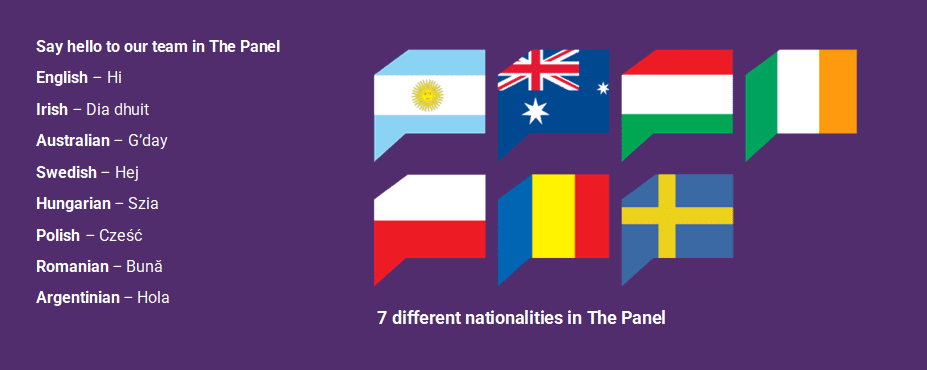
We instill the following approach through rigorous training of our employees;
- Equal Employment Opportunity is a fundamental right of all employees and applicants for employment.
- The Panel undertakes not to discriminate unfairly against any applicant in respect of the subject matter of disclosures made pursuant to the pre-engagement screening process or any other information revealed during the engagement process.
- All applicants are provided a full and fair opportunity for employment, without regard to race, colour, religion, national origin, disability, gender,age,sexual orientation, genetic information, or parental status
- We promote equality for all candidates.
- We foster and support a globally diverse and inclusive workforce with our clients and place a high value on diversity and equal opportunity.
- We believe it is important for applicants to be considered for the employment of their choice and have the chance to perform to their maximum potential.
- The Panel is an equal opportunity Employer and Recruiter.





